LRC News Releases
Committee advances bill on school anti-choking devices

Rep. Candy Massaroni, R-Bardstown, speaks on House Bill 335 during Tuesday’s meeting of the House Veterans, Military Affairs, and Public Protection Committee. A high-res version can be found here.
FRANKFORT — A bill aimed at improving how Kentucky schools respond to choking emergencies advanced Tuesday from the House Veterans, Military Affairs, and Public Protection Committee.
House Bill 335, sponsored by Rep. Candy Massaroni, R-Bardstown, would allow schools and other government facilities to obtain anti-choking devices and provide legal protections for staff who use them during emergencies.
“This bill would allow schools or other government facilities to have anti-choking devices,” Massaroni said. “It would remove the liability to align with Good Samaritan laws we already have.”
The legislation comes after the death of 8-year-old Landon McCubbins of Bardstown, who choked on a small ball in a Nelson County classroom. Emergency responders attempted to dislodge the object but were unable to save him.
Landon’s mother, Lauren McCubbins, spoke in support of the measure.
“Those emergency protocols failed my sweet boy, and there was not an anti-choking device in the school to try to save him,” McCubbins said. “I would give anything for my son to still be alive, and I will do everything in my power to save another child.”
Anti-choking devices are portable, nonpowered suction tools designed to help clear airway obstructions when standard first aid methods, such as abdominal thrusts or back blows, are not successful.
Rep. Nick Wilson, R-Williamsburg, offered condolences to the McCubbins family on behalf of the committee.
Massaroni emphasized that the bill does not require schools to have the devices. “It is not mandated. It is a local control issue. They can decide if they want it or not.”
Rep. Steve Bratcher, R-Elizabethtown, referenced similar legislation that passed the House last session and asked whether a program offering free devices to schools was still available.
Massaroni said the company LifeVac, which had a representative attending the meeting via Zoom, previously offered to donate a device to any Kentucky school that wanted one and may still be willing to participate.
HB 335 passed the committee on a vote of 15-0 and now heads to the full House of Representatives.
Committee OKs child care center bill
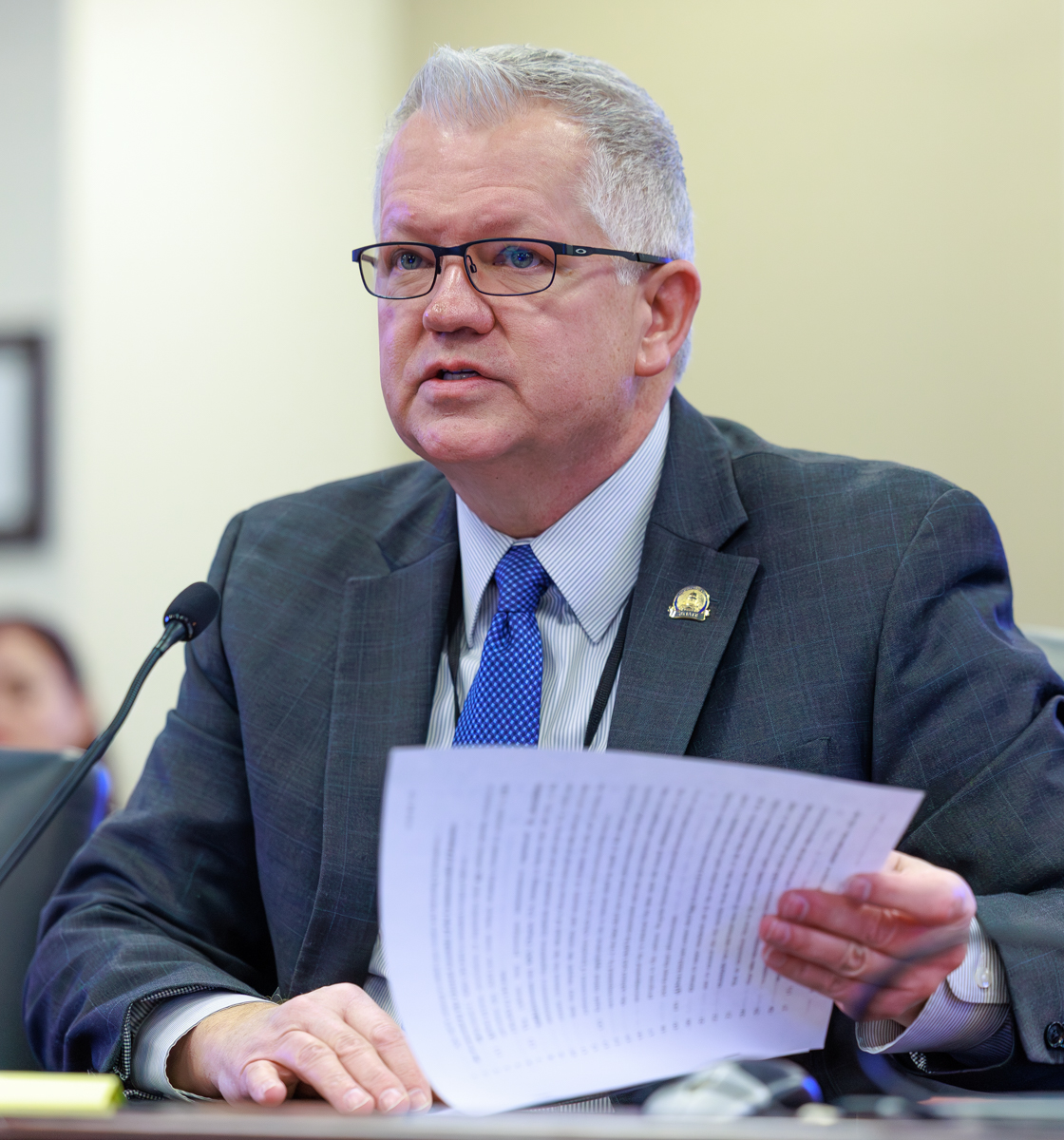
Sen. Danny Carroll, R-Paducah, testifies Tuesday on Senate Bill 160 during a Senate Families and Children Committee meeting. A high-res version can be found here.
FRANKFORT — Legislation that would provide more flexibility and support within the regulatory framework for child care centers advanced Tuesday following a unanimous vote during the Senate Families and Children Committee meeting.
Committee Chair Sen. Danny Carroll, R-Paducah, is the sponsor of Senate Bill 160. He called the measure a very fair and simple bill that offers more latitude to the state Office of Inspector General and the Kentucky Cabinet for Health and Family Services when overseeing child care centers.
“There have been a lot of times that there have been suspensions and revocation of licenses that I don’t think the cabinet really wanted to do,” he said. “But due to the current language, they were forced to do that.”
Under SB 160, health cabinet officials would be required to consider certain factors before issuing a plan of correction, suspension or revocation of a license to a child care center.
Among the considerations is whether the center self-reported the incident in question and has a history of self-reporting incidents. Officials would also need to consider if the incident resulted from a failure in policy, training, enforcement or supervision and whether the failure was an independent act by a director or staff person.
Another consideration would be if the child center appropriately responded to the violation by holding the party responsible for their actions, Carroll said.
The bill would also require that if officials issue a directive plan of correction, that will not result in suspension unless the incident itself was of a serious enough nature to lead to a suspension of the license, Carroll said.
“We want to set them up to succeed, not fail, because these services are crucial,” Carroll said.
Carroll said the bill calls for the cabinet to provide two weekly support contacts to child care centers with preliminary licenses during the center’s six-month probationary period.
“During those six months, the cabinet shall not issue any violations against the child care center unless the cabinet determines that the violation was knowingly committed after the cabinet had provided clear instructions or the violation created an immediate threat to the health and safety or welfare of the children in the center,” he said.
Sen. Shelley Funke Frommeyer, R-Alexandria, said her eight-month-old niece died from suffocation in child care due to a mattress that was too small for the bed.
“I was told that this facility had been inspected. So, my question is the frequency of inspections,” she said. “When a violation is determined, how quickly is it verified that things are in good order and that baby isn’t put back in a bed like she had died in.”
Carroll said when something like this occurs, the response would be immediate.
“There are reporting requirements within the time frame. Obviously, something of that serious of a nature, Child Protective Services would be involved. So, those responses would be very quick,” he said.
Senate Minority Caucus Chair Reginald L. Thomas, D-Lexington, said he was sorry for Funke Frommeyer’s loss, and generally, those at child care centers want to do the right thing. He said he favors the bill, especially the contact information for centers with preliminary licenses.
“Most of them, particularly the private ones, do struggle because of money, because of the difficulty in finding good staffing because of turnover, particularly. It’s sometimes a little difficult for them, but I think this bill is a step in the right direction to try to reach a balance,” he said.
Senate green lights principal training program bill

Sen. Stephen West, R-Paris, speaks Monday on the Senate floor regarding Senate Bill 4. SB 4 would create a training program for new principals in Kentucky. A high-resolution photo can be found here.
FRANKFORT — The Senate on Monday unanimously advanced a bill that would create a training program for new school principals in Kentucky.
The bill's sponsor, Sen. Stephen West, R-Paris, said the program would span five years and provide leadership and development opportunities. The state would partner with the Kentucky Chamber Foundation to provide intensive training during the fourth program year.
West said the goal of the program is to be the best of its kind in the United States. The bill would codify an on-going relationship with the Kentucky Chamber of Commerce that has spanned approximately 11 years, among other measures.
"It mandates a five-year pathway. Year one and year two are handled by the Kentucky Department of Education. They already do some of this work anyway," he said. "This would just enhance some of the work they're already doing and maybe put that on steroids a little bit. Maybe make it go a little bit further and hopefully, eventually, give them the money to do so – being a principal 101."
West said the program would instruct new principals about several topics, including school security, liability, and working with teachers and helping them in the classroom.
During the first two years, there would be a principal mentorship program. Each new principal will be aligned with and assigned to a principal with significant experience. Retired principals could also be mentors, he said.
Year three is a gap year to digest the things participants learned. They still must complete their continuing education, West said.
During the fourth year, the principals would travel to North Carolina for training, he said.
"We have a partnership with Truist Bank and the Kentucky Chamber of Commerce where principals will leave Kentucky after the school year is over, this is not during the school year. But they will travel to North Carolina to the Truist facility down there for leadership training. This is a proven training system," West said. The Kentucky Chamber is bringing its own member dollars through its foundation to help train principals in the program, and West said he will seek full funding for the measure as it moves through the legislative process this session.
Year five of the program is set aside for high-level intensive leadership training through vetted groups. There is already a list of entities with employees who are willing to do the training, West said.
Senate Democratic Floor Leader Gerald A. Neal, D-Louisville, said he likes that the bill is "very intentional" and is "exceptional."
Senate Minority Caucus Chair Reginald L. Thomas, D-Lexington, said he favors the bill, and it should move Kentucky's school systems forward. However, he expressed concern that the language should be changed to "first-time" principals instead of "new" principals.
"It's a good bill. I applaud the senator from Bourbon for this. So, I do vote yea," he said.
Two other education bills were unanimously advanced Monday by the Senate – Senate Bill 2 and Senate Bill 71.
Senate Bill 2, sponsored by Sen. Julie Raque Adams, R-Louisville, would prohibit administrators from receiving a percentage pay increase greater than the average percentage pay increase provided to classroom teachers in that district.
Adams said SB 2 reflects a core principle – that compensation decisions should align with classroom priorities while still respecting local governance and flexibility.
Senate Bill 71, sponsored by Sen. Matthew Deneen, R-Elizabethtown, would require school board members to go beyond the current three hours of financial training and obtain two additional hours of training every two years.
House approves school bus stop-arm camera bill
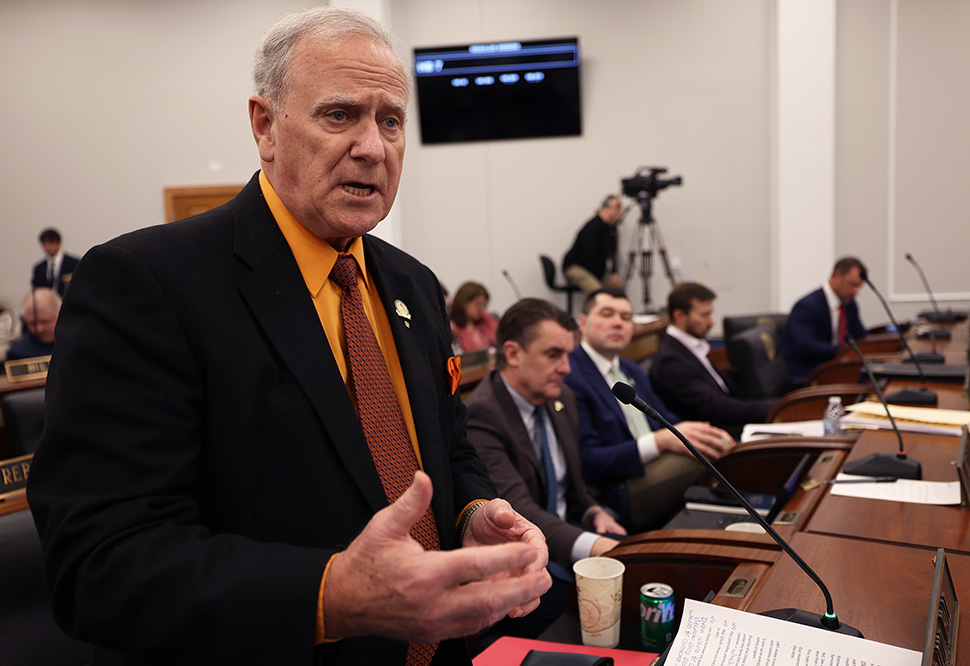
Rep. David Hale, R-Wellington, speaks on House Bill 7 on the House floor on Monday. The legislation would allow school districts to install stop-arm cameras on school buses. A high-res version as available here.
FRANKFORT — A Kentucky House bill geared toward preventing school bus stop-arm violations advanced off the House floor on Monday.
Rep. David Hale, R-Wellington, said House Bill 7 would make it easier for school districts and law enforcement to hold drivers who violate the law accountable.
Data shows there are more than a thousand school bus stop-arm violations daily on Kentucky roadways, Hale said.
"You can ask your school bus drivers in your districts," he added. "I'm sure that they could tell you the violations or things they see on a daily basis that definitely bring a lot of possible harm to those individuals who are exiting the buses or getting onto those buses."
HB 7 would give school districts permission to install stop-arm cameras on school buses. Hale said the bill is not a mandate.
"It sets up an entirely violator-funded stop-arm camera safety program," he said.
If a school district chooses to install stop-arm cameras, Hale said the vendor would collect the data and share the violator's information with local law enforcement. From there, law enforcement would review the footage before contacting the violator and issuing a civil penalty.
"(Law enforcement) would actually have to sign a sworn statement that they had viewed the video and that a violation did occur," Hale said.
Violators would be fined $300 on the first offense and $500 on the second or subsequent offense, according to the bill.
To ensure due process, Hale said fined individuals would have up to 60 days to file an appeal in district court.
For individuals who do not pay the fine after 60 says, Hale said the local law enforcement agency could contact the Department of Transportation to have the violator's motor vehicle registration suspended.
In seeking clarification on who pays for the stop-arm camera installation, Rep. Mary Lou Marzian, D-Louisville, asked Hale if the school district would have to pay for installation up front.
Hale said school districts would not have to pay in advance to install the cameras. Instead, the vendor the district chooses to contract with would be reimbursed through the collection of violation fees.
Marzian then spoke in-favor of the legislation.
"I think it's a really great safety measure for our school buses," she said.
Before voting on the legislation, Rep. Bobby McCool, R-Van Lear, said if the legislation saves one life, it will be worth it. McCool shared he was once hit by a truck while exiting a school bus.
"It did change my life," McCool said. "I'm a lucky one. The next one might not be."
After a 78-15 vote, HB 7 now will go before the Senate for consideration.
This Week at the State Capitol (2-6-26)

Snow continued to cover much of the Capitol campus during the fifth week of the 2026 legislative session. But it didn't hinder the Kentucky General Assembly from acting on dozens of bills throughout the week. A high-res version can be found here.
FRANKFORT — Education remained in the spotlight during the fifth week of the 2026 legislative session as lawmakers advanced a series of high-profile bills on school governance, administrative salaries, budgeting, literacy, and academic assessments.
The Kentucky General Assembly hit the one-third mark in the 60-day session on Wednesday, and proceedings in the chambers continue to grow longer as more bills are called up for floor votes. The House, for instance, passed 14 bills off the floor this week.
On Monday, the Senate action focused on two bills that the Senate Majority has highlighted as priority education bills for the year.
Senate Bill 1 would effectively revamp the governance structure of Jefferson County Public Schools by creating more specific responsibilities for superintendents and boards of education in large, complex school districts.
The legislation also seeks to lay out a legal justification for why the general assembly has a compelling interest in intervening in large districts like Jefferson County. It follows a similar measure that passed the legislature in 2022, but was later struck down in the courts.
SB 1 cleared the Senate 29-7 and now heads the House.
The chamber was more united on Senate Bill 3, which seeks to enhance financial transparency within school districts. It calls on districts to publish financial documents online and establishes new timelines and procedures for adopting budgets, presenting information at public meetings and reporting on finances.
Lawmakers sent that measure to the House with a 35-1 vote.
The House Primary and Secondary Education Committee took up a major education bill on Wednesday that would end the use of the three-cuing model in Kentucky schools by the 2029-30 academic year.
The three-cueing approach teaches students to read by recognizing whole words and using context clues to decipher language. However, the model has faced growing criticism in recent years. House Bill 253 seeks to replace that model with evidence-based reading approaches that emphasizes techniques like phonetic awareness and phonics.
The committee advanced HB 253 with another bill focused on educational assessments.
House Bill 257 calls for the state's education accountability standards to focus on student growth. It would also reduce state testing, prioritize attendance and allow districts to adopt locally-defined quality indicators.
Both bills now head to the full House for consideration.
Education emerged again on Thursday when the Senate Education Committee advanced Senate Bill 2. It would prohibit school administrators from receiving a percentage pay increase that is greater than the average percentage pay increase provided to classroom teachers in that district.
The committee also voted in favor of Senate Bill 4 to create a five-year training program that provides leadership development and mentorship opportunities for new school principals in Kentucky. The state would partner with the Kentucky Chamber of Commerce to provide intensive training during the fourth year of the program.
Both SB 2 and SB 4 now head to the full Senate.
Many other bills are progressing though the legislature, including measures on grooming, fluoride, trauma centers and housing. Here's a look at some of the bills that moved forward this week.
Hearing Aids – House Bill 164 would increase the coverage amounts that health insurance plans provide for purchasing hearing aids and related services for minors. The House passed the bill Monday.
Cigar Bars – House Bill 194 would create clear guidelines for cigar bars to operate in local communities, including certain requirements related to smoke exposure, age limits and revenue thresholds, among others. The House advanced the legislation Tuesday.
Eating Disorders – House Bill 169 calls on health insurance plans that provide behavioral or mental health care coverage to also provide coverage for the diagnosis and treatment of feeding or eating disorders. HB 169 won support in the House on Tuesday.
Inmate Reentry – Senate Bill 48 would prohibit repeat violent offenders from qualifying for mandatory reentry supervision, which allows certain inmates to leave prison under community supervision near the end of their sentences. The Senate passed the bill Tuesday.
School Bus Safety – House Bill 7 would allow school districts to install traffic cameras on school buses to help enforce laws against stop-arm violations. The House Transportation Committee gave the bill a green light on Tuesday.
Robotics Education – House Bill 44 would create a state trust fund for promoting robotics education in Kentucky high schools. Grants from the trust fund would also support efforts to create community partnerships and career pathways for students in the field. The House Primary and Secondary Education Committee passed the bill Wednesday.
Grand Jury Confidentiality – House Bill 305 would extend the statute of limitations from one year to 10 years for prosecuting anyone who secretly records grand jury proceedings. It would also extend the statute of limitations for unlawfully sharing grand jury testimony from one year to five years. The House Judiciary Committee approved HB 305 on Wednesday.
Grooming – House Bill 4 would criminalize efforts to manipulate a minor into sexual contact with an adult, a practice known as "grooming." The House voted for the bill Wednesday.
Geoengineering – House Bill 60 would prohibit the injection of certain chemicals into the atmosphere with the intent to modify the weather. The House Committee on Natural Resources and Energy advanced the bill Thursday.
Trophy Catfish – House Bill 397 would prohibit a person engaged in commercial fishing from transporting live trophy catfish, except by boat, beginning in 2027. The bill cleared the House Committee on Natural Resources and Energy on Thursday.
School Board Financial Training – Senate Bill 71 would enhance the financial training requirements for local school board members. The Senate Education Committee voted in favor of the bill Thursday.
Fluoride in Drinking Water – House Bill 103 would allow officials at local water systems to opt out of adding fluoride to their water supply. The House passed the measure Thursday.
Backyard Chickens – House Bill 276 would allow residents to keep up to six chickens on their residential property for personal egg production or educational purposes. It would also prevent local governments from outright banning the practice of keeping chickens. HB 276 cleared the House on Thursday.
Locally-Grown Food – Senate Bill 5 would make it easier for Kentucky schools to purchase locally-grown food for student meals. It seeks to lift some procurement requirements and better connect students with the agricultural economy. The bill cleared the Senate Agriculture Committee on Tuesday and advanced off the Senate floor Thursday.
Trauma Centers – Senate Bill 12 seeks to allow more of Kentucky's hospitals to be designated as Level IV trauma centers, particularly in rural areas of the commonwealth that are facing shortages in health care. Among several changes, the bill would ease some of the staffing standards required in current law. The Senate advanced the bill Thursday.
Veteran PTSD – House Bill 369 would add post-traumatic stress disorder to the list of medical conditions that allow veterans to qualify for hyperbaric oxygen therapy. The House Committee on Veterans, Military Affairs and Public Protection advanced the bill Tuesday, and the House voted in favor of the measure Friday.
Affordable Housing – House Bill 333 would allow faith-based organizations to build small-scale affordable housing units on property located near religious institutions. The House Local Government Committee passed the bill on Tuesday, and the measure cleared a House vote Friday.
Massage Therapy – Senate Bill 132 would strengthen local oversight of massage businesses while toughening penalties for unlicensed practices in an attempt to combat human trafficking. The bill cleared the Senate State and Local Government Committee on Wednesday and received a favorable vote on the Senate floor Friday.
Lawmakers are scheduled to reconvene on Monday for day 23 of the session.
Kentuckians are urged to check the general assembly's calendar for updates. Kentuckians can track the action through the Legislative Record Webpage, which allows users to read bills and follow their progression through the chambers.
Citizens can also share their views on issues with lawmakers by calling the general assembly's toll-free message line at 1-800-372-7181.
Senate passes massage therapy bill aimed at curbing human trafficking
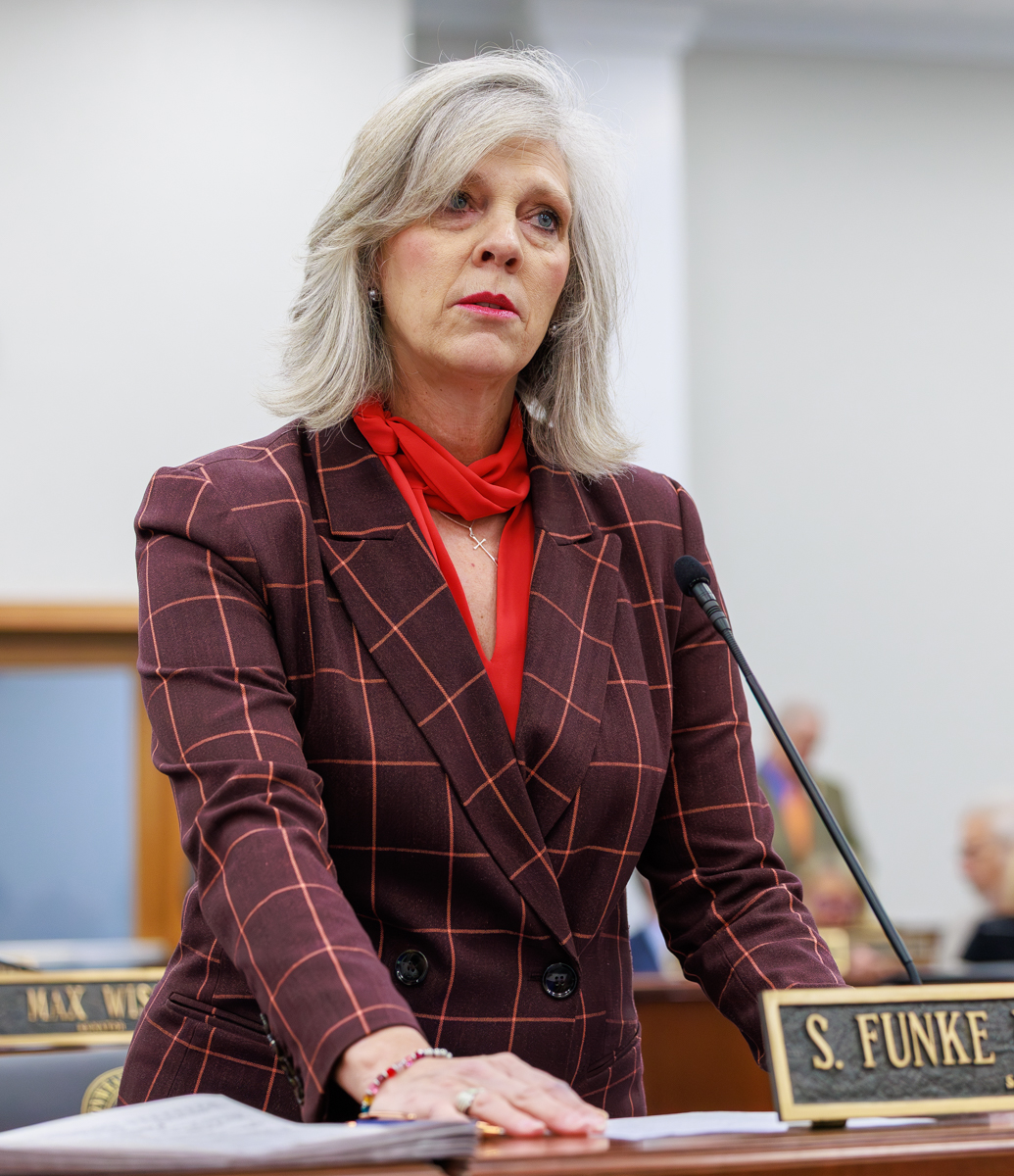
Sen. Shelley Funke Frommeyer, R-Alexandria, speaks on Senate Bill 132, which strengthens local control over massage therapy businesses, on the Senate floor. A high-resolution photo can be found here.
FRANKFORT — A bill that would strengthen local oversight of massage businesses while toughening penalties for unlicensed practices passed on the Senate floor Friday.
Sen. Shelley Funke Frommeyer, R-Alexandria, said that the bill is not about hurting massage businesses, but rather, stopping massage businesses that are fronts for human trafficking.
"Senate Bill 132 expressly authorizes cities to adopt and enforce ordinances related to zoning, occupational licensing requirements, fees, inspections, advertising, hours of operation, and sanitation," Frommeyer said.
SB 132 clarifies that state law continues to supersede any local ordinances or regulations that directly regulate massage therapists: things like therapist certification requirements, training standards, and the scope of a therapist's practice.
However, the bill makes clear that this state preemption does not extend to any local ordinances that govern how these massage businesses operate, which clarifies local authority beyond prior, narrower exceptions.
"This clarification ensures that local governments can more effectively investigate complaints and address illegal activity at businesses representing themselves as massage parlors while leaving regulation of the practice of massage therapy itself with the state," Frommeyer said.
The bill also raises the penalty for practicing massage therapy without a license from a class B misdemeanor to a class A misdemeanor, and specifies that each individual massage performed without a license counts as a separate offense.
Senate Minority Whip Cassie Chambers Armstrong, D-Louisville, asked Frommeyer if the bill would preempt a recently passed Louisville ordinance that requires massage businesses to display posters with information regarding human trafficking and the human trafficking hotline number.
Frommeyer responded that the bill would only support that ordinance, and that other communities, as a result of the bill's passage, a might expect such ordinances in the future.
Armstrong then spoke in favor of the bill, noting that it supports Louisville and other cities seeking to combat human trafficking. She also raised some concerns with the penalties section of the legislation.
"What worries me particularly is that there is nothing in the bill that I see that provides preemptive protections for victims of human trafficking, and so I prefer that we add a requirement that somebody knowingly and willingly held themselves out as an unlicensed massage therapist so that we aren't overbroadly catching those who have been trafficked," Armstrong said.
Sen. Lindsey Tichenor, R-Smithfield, said she was voting "yes" on the legislation and commented on what she thought could strengthen efforts to combat trafficking in the future.
"This is a small effort as we move forward to address this issue. Something I would like to see in the future is our strengthening of the laws and efforts to prosecute not only the business owners who are involved in offering this at all, but also those who are furthering the need for the market to exist at all," she said.
The Senate voted 32-0 to send the bill to the House.
Senate OKs trauma center bill after impassioned debate
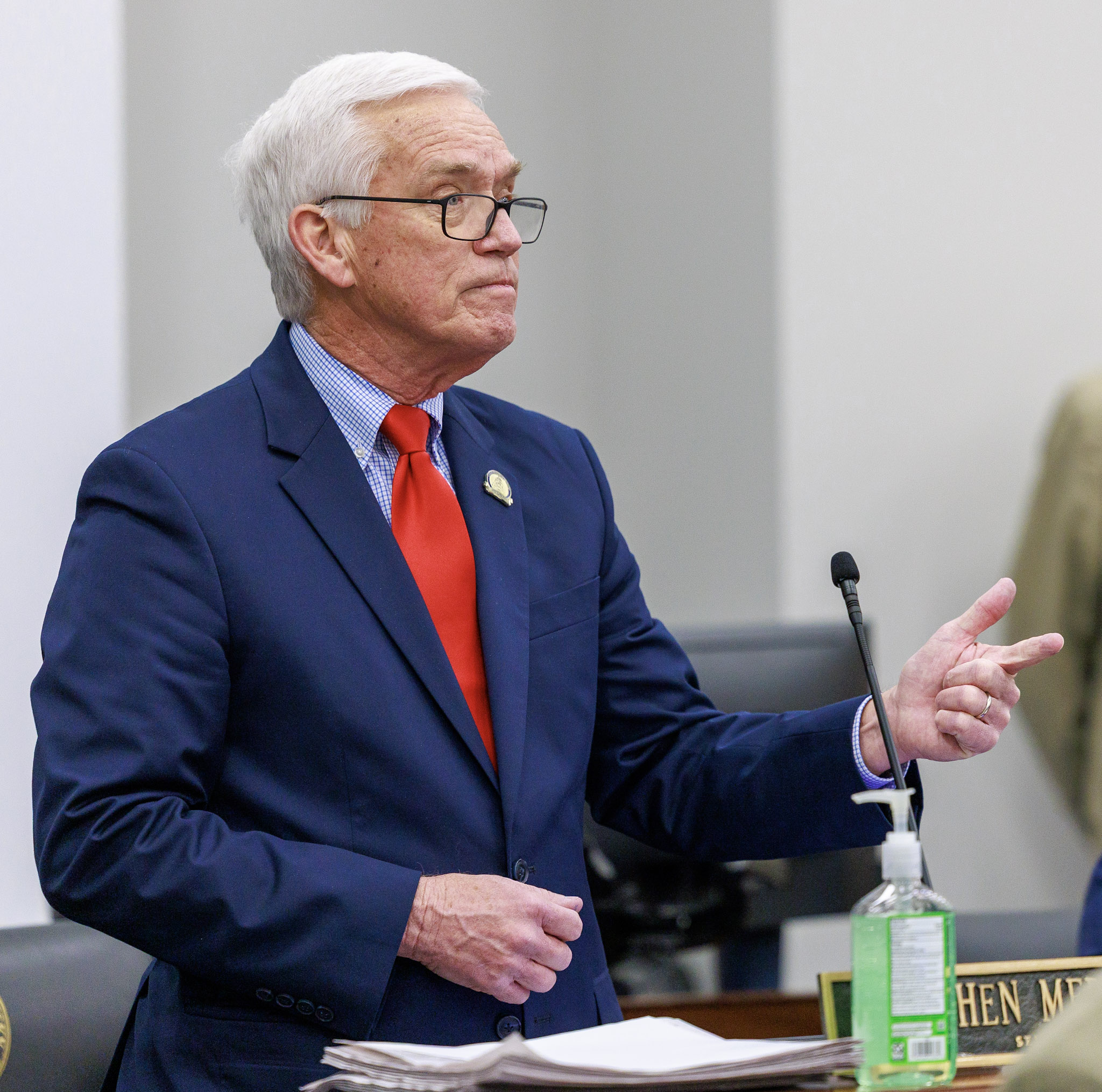
Sen. Stephen Meredith, R-Leitchfield, speaks Thursday on Senate Bill 12 on the Senate floor. SB 12 relates to medical provider coverage in Level IV trauma centers. A high-resolution photo can be found here.
FRANKFORT — A bill that would allow more Kentucky hospitals to be designated as Level IV trauma centers received approval in the Senate on Thursday following impassioned debate on the chamber floor.
Bill sponsor Sen. Stephen Meredith, R-Leitchfield, said Level IV is the lowest designation of trauma center in Kentucky. The state passed legislation in 2008 to establish a statewide trauma network but never appropriated funding, he said.
Senate Bill 12 is seeking to ease some of the legal standards to help grow the network, particularly in rural areas that are struggling with gaps in health care, Meredith said.
National standards from the American College of Surgeons allow trauma centers to operate with a mid-level practitioner under the supervision of a physician, but Kentucky's law does not make that distinction, he said.
SB 12 would allow Kentucky Level IV trauma centers to operate if either a physician or an advanced practice provider is supervised by an on- or off-site physician at all times.
Meredith said the legislation would align Kentucky with the national standards while providing clear oversight, approved processes and approved coordination that ultimately supports patient care and more efficient transfers.
"We're 45th nationally in trauma-related deaths and a good measure because of a lack of those resources," he said. "We need to build that network. I'm not here to ask for an appropriation today. I'm asking for relaxing some standards to expand our network."
Meredith read a letter from the chief executive officer of the Crittenden Community Hospital, who wrote that many Kentucky hospitals provide the same level of care as a Level IV trauma center, but do not qualify as a Level IV due to staffing.
The bill drew debate on the Senate floor as supporters argued that the changes are needed to boost health care in rural Kentucky. Opponents raised concerns about the lack of an on-site physician.
One critic was Sen. Karen Berg, D-Louisville, who said that, as a physician who has worked in trauma at the University of Louisville for several years, she has concerns about lowering standards.
"Unfortunately, this part about having non-physicians in Level IV trauma centers is for me and for the trauma network that I have worked my entire life in, unacceptable," she said. "It is unacceptable because time is life. And to transport a patient to a facility where you know you do not have a medical doctor to respond is a waste of time."
Sen. Donald Douglas, R-Nicholasville, who is also a physician, voted against the measure. He said doctors are concerned generally about the lowering of standards in health care and that even though some health care workers can perform some of the duties of a doctor, that doesn't make them equal.
"Medical doctors and all specialties, this might be news for you all, but they're feeling disrespected. And they're feeling devalued," he said. "We let other people creep closer and closer to having the privileges that we worked so many hours to have, that we took so many tests to have."
However, Sen. Scott Madon, R-Pineville, recalled how a local hospital in his district was facing bankruptcy and all of the doctors left to work in rural health clinics. He said he supports SB 12 because it's a tool for his community to keep the hospital open.
"They're not asking for a hand out, they want a hand up. They want a way to keep their hospital open," he said.
Sen. Gex Williams, R-Verona, said he enthusiastically supports the bill.
"I hope that as we get these physician assistants out into our rural communities, that they can tell their families about the Kentucky lives they saved, about the Kentucky injuries that they have kept and not some neighboring state," he said. "We need this bill passed and we need it passed as soon as possible so that we can get our Kentuckians the kind of rural health care that every state around us has."
Meredith said the bill isn't the ultimate solution, but emergency room doctors and primary care doctors aren't coming to Kentucky.
"To ask us just to wait for health care or drive up the road, that's unreasonable. It's not fair. It's terribly unfair," he said. "And that's all we're asking is let these hospitals have some additional resources so they can lift themselves up to be the best that they can be. That's all this amounts to. It's not replacing doctors."
The bill cleared the Senate on a 27-11 vote and now heads to the House for consideration.
Senate committee advances bill on school leaders' salaries
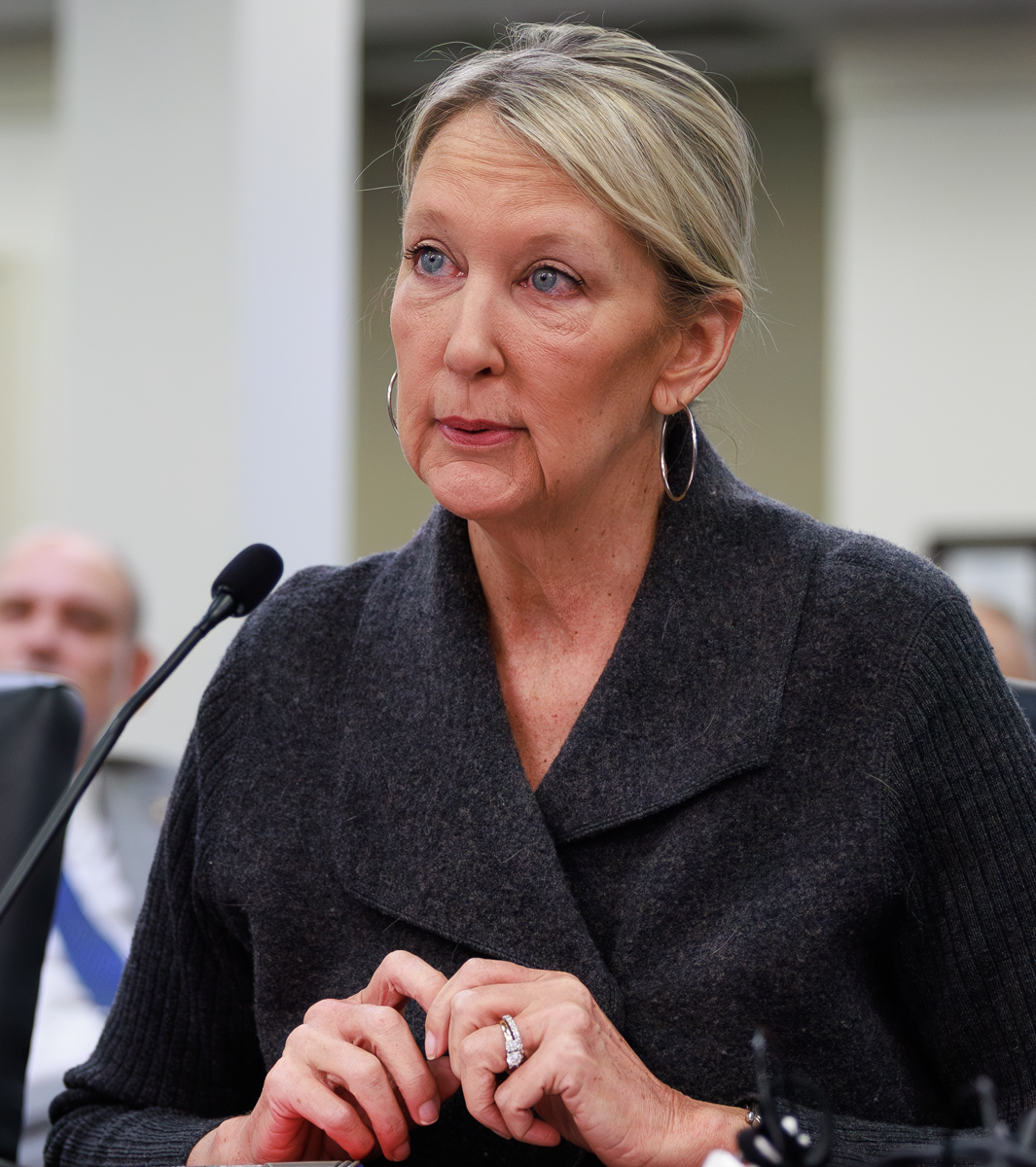
Sen. Julie Raque Adams, R-Louisville, testifies Thursday on Senate Bill 2 to the Senate Education Committee. A high-resolution photo can be found here.
FRANKFORT — A bill to ensure that classroom teachers aren't left behind when school districts consider pay raises for administrators was unanimously advanced Thursday by the Senate Education Committee.
Bill sponsor Sen. Julie Raque Adams, R-Louisville, said Senate Bill 2 reflects a core principle – that compensation decisions should align with classroom priorities while still respecting local governance and flexibility. The legislation would establish a clear, reasonable standard without eliminating existing waiver options already permitted under Kentucky law, she said.
"Specifically, the bill prohibits school administrators from receiving a percentage pay increase greater than the average percentage pay increase provided to classroom teachers in that district," she said.
The bill would reinforce fairness in compensation practices across school systems and reflect the value of classroom instruction in district-level decision making, Adams said.
Adams said the bill would not eliminate local control over compensation decisions and would not cap salaries or mandate specific pay raises. Additionally, it would not prevent districts from rewarding leadership or compensation for increasing responsibilities provided that those decisions remain balanced and fair to teachers.
"Classroom teachers are the center of student learning and school success. When compensation decisions favor administrative growth over classroom instruction, it can undermine morale, trust and long-term workforce stability," she said.
Senate Bill 2 is designed to promote fairness and transparency, support teacher recruitment and retention and reinforce public confidence in education funding decisions," Adams said.
Senate Minority Caucus Chair Reginald L. Thomas, D-Lexington, said he supports the bill, but retaining talent is highly important. He asked if the bill would prevent a school board from renegotiating the salary of a superintendent if that superintendent was being recruited by other communities.
"We do that in any organization, whether we're talking about Fortune 500 companies or in major sports leagues across this country or in any endeavor. If you have talent, and that talent threatens to go somewhere, you should want to take time or make time to try to retain that talent," he said.
Adams said the waiver option would be available in those cases.
"If that district wants to maintain that superintendent, and they feel that a funding decision is important in that retention, then they have that waiver option within this bill to make that decision. But that decision will be transparent, and everyone will know that's what's happening," she said.
Senate President Pro Tempore David P. Givens, R-Greensburg, said teachers are the backbone of schools.
"Let's not kid ourselves – the rubber meets road where the teachers are in the classroom and meeting those kids day in and day out and I applaud all of those teachers," he said. "And thank you for leading on this legislation that effectively says whatever you're going to increase in administrators' pay, you've got to increase that teachers' pay by that much or more," he said.
Sen. Stephen Meredith, R-Leitchfield, said from a rural perspective, more focus might be needed on principals rather than superintendents. He said finding and keeping talent is a growing challenge, and he expressed concern that rural districts can't react quickly enough to increased salaries in urban areas.
"I'm concerned about the unintended consequences for rural communities. I understand what you're trying to accomplish, and I applaud that and I support that. I just don't think this is the vehicle to do it," he said.
Givens said his understanding is the waiver process is expedited very quickly.
Senate Democratic Floor Leader Gerald A. Neal, D-Louisville, said he's concerned districts aren't fully funded in general.
Sen. Steve Rawlings, R-Burlington, said years ago when Japan was experiencing expansive economic development, he heard a story about how chief executive officers couldn't make more money than nine times what the very lowest-paid person could make.
"I definitely support this bill. I like the context and manner and the thoughtfulness for which it's done. So, I'm a yes vote," he said.
Trophy catfish preservation bill catches committee approval
Correction: An earlier version of this story, published on Feb. 5, stated that House Bill 397 would prohibit commercial fishing and transport of live trophy catfish. The bill would not prohibit commercial fishing. Instead, it would prohibit a person engaged in commercial fishing from transporting live trophy catfish, except by boat, beginning in 2027. A corrected version of the story is available below.

Rep. DJ Johnson, R-Owensboro, explains why House Bill 397 is needed to preserve the trophy catfish population during Thursday's House Natural Resources and Energy Committee meeting. A high-resolution photo can be found here.
FRANKFORT — The Kentucky House is considering legislation that aims to preserve the trophy catfish population in the lower Ohio River and its tributaries.
House Bill 397 would prohibit the transport of live trophy catfish for commercial purposes, except for by boat, beginning in 2027.
The bill's primary sponsor Rep. DJ Johnson, R-Owensboro, told the House Natural Resources and Energy Committee that the bill would not prohibit recreational catfishing or tournaments.
HB 397 would define a trophy catfish as a blue or flathead catfish of at least 35 inches in length or a channel catfish that is at least 28 inches in length.
"In short, it takes 15 to 20 years for a catfish to reach trophy size. Left alone in their natural habitat, they can live much longer than that. But when removed from the river and placed on a commercial lake, their lifespan is much, much shorter," Johnson said.
The bill would make the practice a class A misdemeanor. The legislation would also issue a $500 replacement fine for any trophy catfish that is wounded or dies in the process of being unlawfully transported.
Johnson said since trophy catfish can only survive in a lake environment for a few months at best, and HB 397 is needed to protect these animals.
"If we continue to remove a natural resource that takes years to create and place them in an environment for only a period of weeks or months, we will eventually deplete that resource entirely," Johnson said. "That is what is happening with respect to trophy catfish."
Nick Hart, a lobbyist with the Kentucky Waterways Alliance, told the committee the conservation community supports the legislation.
"These (fish) are the breeders," Hart added. "These are the fish that are going to create the next stock."
House Majority Caucus Chair Suzanne Miles, R-Owensboro, said she wants to ensure the bill would not impact recreational catfishing activities in her district.
"I just want to go on the record and make sure this has no effect on changing the Butler County Catfish Festival that happens the first week of July – the catfish wrestling or the catfish catching," Miles said.
Johnson said HB 397 "does not impact the festival in any way."
The House Natural Resources and Energy Committee voted unanimously to approve HB 397 with one pass vote from Rep. Tom Smith, R-Corbin.
Smith said he has heard a few concerns from constituents that he plans to seek more clarification on before deciding how he will vote on the bill on the floor.
HB 397 is now before the full House for consideration.
Bill advances on safeguarding grand jury testimony
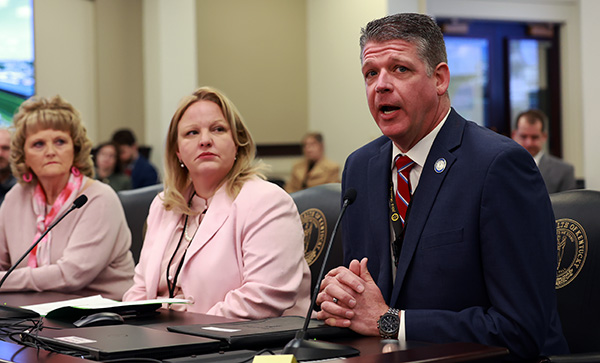
Rep. Candy Massaroni, R-Bardstown, (center) presents House Bill 305 during Wednesday's meeting of the House Judiciary Committee. Joining her is Jackie Steele (right), commonwealth's attorney for the 27th Judicial Circuit, and Sherry Ballard (left), the mother of Crystal Rogers. A high-resolution photo can be found here.
FRANKFORT — A House bill aimed at strengthening protections around grand jury secrecy advanced Wednesday in the House Judiciary Committee.
The legislation would extend Kentucky's statute of limitations for prosecuting anyone who secretly records grand jury proceedings from one year to 10 years. It would also extend the statute of limitations for unlawfully sharing grand jury testimony from one year to five years.
Rep. Candy Massaroni, R-Bardstown, said the measure is designed to protect the integrity of the grand jury process and ensure those who violate its secrecy can still be held accountable years later.
"This bill is to protect the integrity of the grand jury and to extend the statute of limitations for anybody secretly recording grand jury testimony," Massaroni told committee members.
Grand juries are used to review evidence in serious criminal cases and determine whether charges should be filed. Proceedings are conducted in secret to protect witnesses, safeguard investigations, and prevent testimony from being influenced.
Sherry Ballard, the mother of Crystal Rogers, spoke in support of the bill. Rogers, a Bardstown mother, disappeared in 2015. Ballard said the proposed changes could have made a difference in her daughter's case.
During the investigation, the FBI discovered some recordings during a search on the suspect's property, Ballard said. "This was years after my daughter went missing."
Investigators later determined the recordings included grand jury material. Because of the current one-year statute of limitations, no charges were filed related to the recordings, Ballard said.
Jackie Steele, commonwealth's attorney for the 27th Judicial Circuit, told lawmakers the issue extends beyond a single case. He said illegal recordings of grand jury proceedings can affect drug investigations and even lead to the sale of sensitive testimony on the black market.
"There are protections within the judicial system for that material so it doesn't get out, but if someone is recording, it unknowingly gets out," Steele said.
Steele proposed an amendment to clarify that routine grand jury functions, such as issuing subpoenas or conducting interviews, would not create legal issues for prosecutors.
"We are for the bill, other than just allowing us to do our job without committing a class D felony," Steele said.
Lawmakers asked questions about the broader impact of the bill.
House Majority Whip Jason Nemes, R-Middletown, asked why it is critical to prevent recordings from being shared publicly. Steele said secrecy is essential to prevent witnesses from tailoring their testimony.
"That way further testimony cannot be tailored to cover for somebody," he said.
House Minority Caucus Chair Lindsey Burke, D-Lexington, asked whether someone who both records and distributes grand jury material could face two charges. Steele said they could be charged separately for each offense.
Rep. T.J. Roberts, R-Burlington, asked whether recordings put witnesses at risk. Steele said fear of exposure is a real concern, especially in smaller communities.
"When you get to smaller jurisdictions, you're hearing cases about your neighbor," Steele said. "If you can't deliberate honestly because you're scared somebody's recording it and playing it to your neighbors, that's an obstruction of justice."
Several lawmakers thanked Ballard for advocating for changes and her persistence in fighting for justice in her daughter's case.
House Judiciary Chair Rep. Daniel Elliott, R-Danville, said the legislation should be known as the "Crystal Rogers Act."
The bill passed the committee and now heads to the full House of Representatives.
Evidence-based literacy bill green-lit by House committee
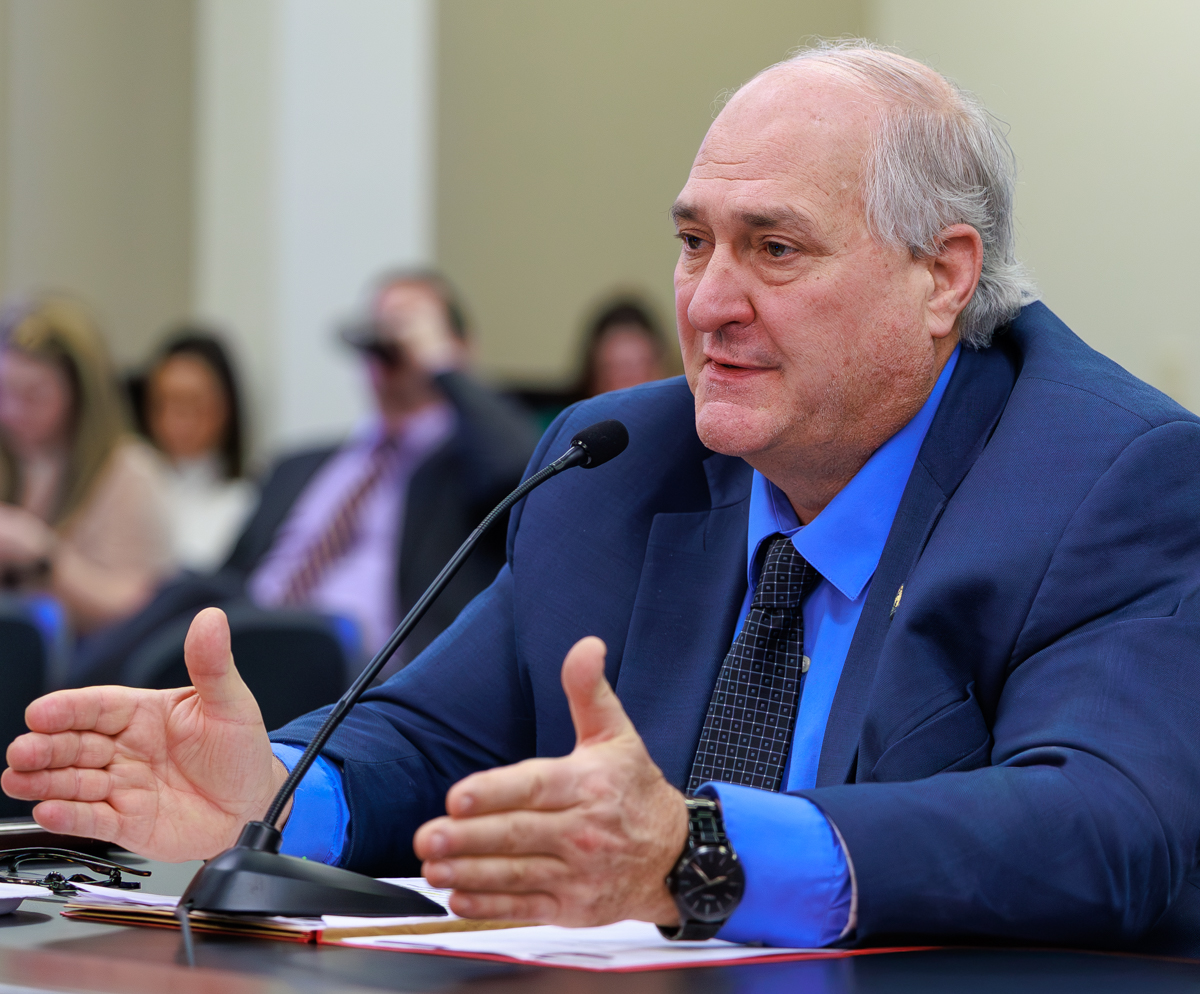
Rep. James Tipton, R-Taylorsville, explains why Kentucky needs to end the three-cuing system teaching model of reading in schools through House Bill 253. The discussion was part of Wednesday's House Primary and Secondary Education meeting. A high-resolution photo can be found here.
FRANKFORT — Literacy curriculum similar to the "Mississippi Miracle" may be coming to elementary school classrooms across Kentucky by 2029.
Rep. James Tipton, R-Taylorsville, and Rep. Tina Bojanowski, D-Louisville, are the primary co-sponsors of House Bill 253. Tipton presented the legislation to the House Primary and Secondary Education Committee on Wednesday.
Tipton said Mississippi implemented new literacy curriculum in 2013 that has transformed the state's literacy rates. Other states inspired by Mississippi's success have begun to implement similar curriculum.
Under HB 253, the three-cuing system teaching model for reading would be banned in Kentucky public schools by the 2029-30 school year.
"We have seen research recently that shows that it is not nearly as productive as the Science of Reading's five essential components of reading: phonetic awareness, phonics, vocabulary, fluency and comprehension," Tipton said. "In fact, there is a detriment to using the three-cuing method."
Under the three-cuing method, students memorize what words look like instead of developing the ability to understand letter sounds and decode language, Tipton said.
"If you teach a student to memorize what 10 words look like, they will know 10 words," Tipton said. "But if you teach them 10 sounds through phonetics, they will be able to speak thousands of words."
In 2022, the general assembly passed Read to Succeed Act. Since then, 7,000 teachers have completed the KY LETRS program through the Kentucky Department of Education, which is a two-year intensive training initiative for Kentucky teachers on the Science of Reading, Tipton said.
Under HB 253, the department would offer several training programs on the Science of Reading, including LETRS. One program would be about 50 hours, Micki Marinelli, chief academic officer for the department, said.
An earlier version of HB 253 called for an immediate ban on the three-cuing system. Rep. Josh Calloway, R-Irvington, asked Tipton why the bill now delays the implementation to 2029.
"The concern was if we just stopped cold turkey immediately, that a lot of teachers have had no training at all in the Science of Reading," Tipton said, while adding that 19,000 more teachers need to complete LETRS training.
Marinelli told Calloway the department hopes that as more teachers complete Science of Reading training, they will see the curriculum is an evidence-based approach and in the best interest of the students.
Rep. Adrielle Camuel, D-Lexington, told Tipton and Marinelli she's been talking to teachers and reading specialists in her districts who use structured literacy programs that include the three-cuing system. Camuel asked what enforcement of a ban on the curriculum would look like.
"If it's prohibited from being utilized, what does enforcement look like? Are you going to put a whole prohibition on teachers using the tools that they know help students?" Camuel asked.
Tipton said the legislation would require KDE to counsel school districts who are not in compliance with the law.
Marinelli said enforcement of the three-cuing ban would not be about punishment.
"It would be about support," she said. "Everything that we're doing around Read to Succeed is about making an investment in educators for the benefit of students, and so we would want to be in conversation with them."
The House Primary and Secondary Education Committee voted unanimously to advance HB 253 to the House floor. Camuel was the lone pass vote.
"I have a lot of reservations," she said while explaining her vote, adding she has concerns about prohibiting tools that have shown success with certain students.
Bojanowski, who serves as the ranking minority member on the committee, said she's completed the LETRS training and has seen firsthand with her own students how the three-cuing system is not beneficial. She said having students guess the words is not helping her students become stronger readers.
"I support this bill," Bojanowski said.
House approves cigar bar bill
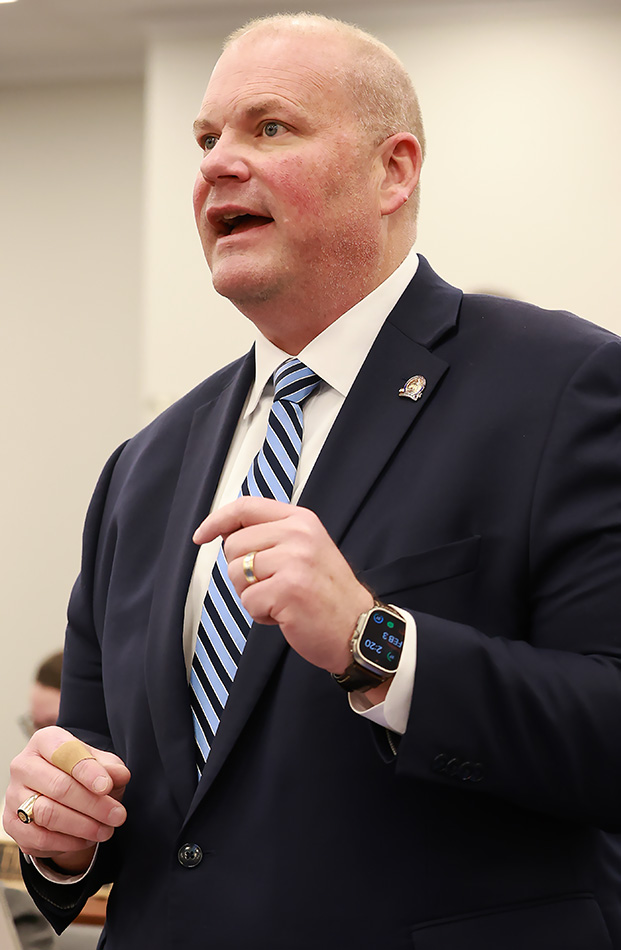
Rep. Chris Lewis, R-Louisville, speaks on House Bill 194, which would allow cigar bars in Kentucky, on the House floor. A high-resolution photo can be found here.
FRANKFORT — A bill that would allow certain businesses to operate as a cigar bar advanced off the House floor on Tuesday.
Rep. Chris Lewis, R-Louisville, said House Bill 194 creates "a narrow exemption" in the law that would allow the smoking of cigars in what the bill defines as a cigar bar.
"If you don't want to be exposed to cigar smoke in a public place where smoke-free laws currently exist, nothing in this bill changes your ability to maintain that separation," Lewis said on the House floor.
Under HB 194, a business would only be permitted to operate as a cigar bar if 25% of the business's gross annual income is derived from the sale of cigars, pipe tobacco, related accessories or the rental of humidors. Additionally, the business must hold a valid quota retail drink license.
The bill would give local governments the ability to enact an ordinance to require cigar bars receive a special permit to operate. Local governments may also exempt cigar bars from the quota retail drink license requirement.
To address health concerns, Lewis said HB 194 would require cigar bars to provide a smoke-free location for deliveries and signage warning potential customers of exposure to cigar and pipe tobacco smoke.
Cigar bars that share a physical wall or a common, enclosed air space with any other structure would be required to implement measures to ensure smoke does not pass into smoke-free areas, Lewis added.
The bill also would prohibit anyone under the age of 21 from entering the business.
Rep. Adrielle Camuel, D-Lexington, asked Lewis to clarify how HB 194 might impact local smoke-free ordinances.
Lewis said there is nothing in the legislation that would allow smoking in bars, restaurants, bowling alleys or anywhere public where current smoke-free ordinances are in place.
"This doesn't prevent any municipality from creating a new smoke-free ordinance, but it would not allow them to ban a cigar bar," he added.
The House voted 69-24 to send HB 194 to the Senate.
Rep. Anne Gay Donworth, D-Lexington, said she was voting "no" on the legislation because her district is against it.
"I do want to thank the bill's sponsor. I think this is a much better version than what we passed last year, having the 25% margin for cigar sales," Donworth said. "I am a no purely because my district has a very, very, very popular indoor smoking ban."
Rep. Al Gentry, D-Louisville, voted "yes" on HB 194. He said although he isn't a smoker, he supports others' right to do it.
"I voted ‘yes' on the bill because I am a proponent of freedom and accountability," he said. "Cigar smoking is legal, so if we want to have a confined space for those individuals to come together and do that, that is their choice."
Senate committee green lights food procurement bill
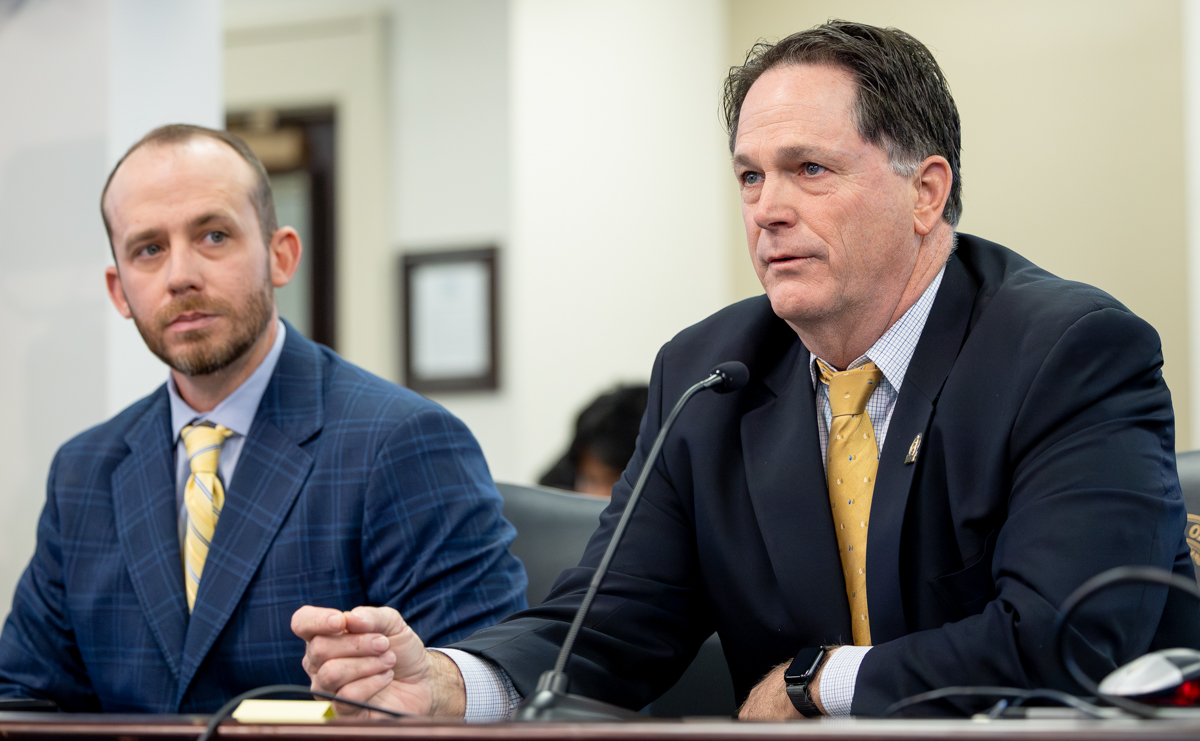
Sen. Jason Howell, R-Murray, (right) testifies Tuesday on Senate Bill 5 during the Senate Agriculture Committee meeting. Joining Howell is Kentucky Agriculture Commissioner Jonathan Shell. A high-resolution photo can be found here.
FRANKFORT — A bill crafted to help Kentucky farmers more easily share their products in students' meals advanced Tuesday during a Senate Agriculture Committee meeting.
Sen. Jason Howell, R-Murray, and sponsor of the measure, said one of the prime goals is to put more locally grown produce into schools to benefit students' nutrition, among other things.
"I think this opens the door to expanding out this arena and having more and more of our local produce be able to go, not just into schools and hospitals, but to be able to develop and push into the mainstream market," Howell said.
Kentucky Agriculture Commissioner Jonathan Shell said the legislation would start the process of decentralizing the current procurement system in schools so that farmers' access to school markets can be bolstered.
SB 5 seeks to break barriers and overcome procurement challenges created by large conglomerates, he said.
"A lot of it's federal. Some of it's state, but it's all-around procurement," Shell said. "It's all-around sourcing. It's all-around guidelines and programs that they've put in place in policy that really have created barriers to limit access for locally grown food."
Shell said there's a larger plan to market farmers' products outside legislation, and many stakeholders are working on these efforts.
Shell said officials with the state education department have been cooperative and open to changing the way procurement has happened for the last 30 years.
Sen. Shelley Funke Frommeyer, R-Alexandria, asked Shell if agriculture discussions are happening in classrooms and if parents are asking for more farm-raised food in cafeterias.
Shell said many stakeholders are collaborating to teach students about agriculture, and there's a focus on students at elementary schools. He said, for example, that agriculture becomes relevant in life because math equations can be used to build a barn and to feed cattle. They also learn about nutrients and how food affects their bodies. School nutritionists have procured locally grown foods during agriculture week and taught students the origins of food, he said.
Senate Majority Whip Mike Wilson, R-Bowling Green, said his family is from Mississippi, and he comes from a long line of farmers. He said he appreciates the legislation.
"Most people, especially kids today, do not know where their groceries come from. They think they come from Kroger. So, I appreciate your efforts in education and especially this in getting it into the schools along with the MAHA that we're doing," he said, referencing recent Make America Healthy Again initiatives.
Affordable housing bill passes
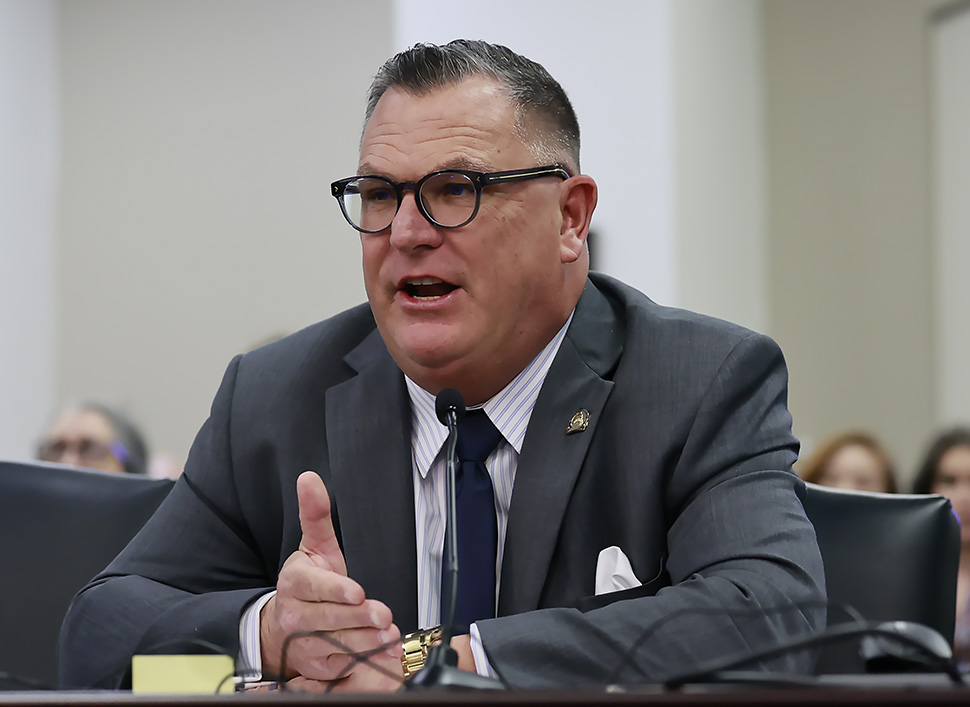
Rep. Michael Sarge Pollock, R-Campbellsville, speaks on House Bill 333, an affordable housing bill, during Tuesday's House Local Government Committee meeting. A high-resolution photo can be found here.
FRANKFORT — A bill that would enable religious institutions to build small-scale affordable housing units advanced from the House Local Government Committee on Tuesday.
Rep. Michael Sarge Pollock, R-Campbellsville, is the primary sponsor of the bipartisan legislation, House Bill 333.
Pollock said the Sisters of Loretto, a Catholic women's organization, reached out to him and Sen. Jimmy Higdon, R-Lebanon, about a plan to renovate an empty structure into short-term housing.
"The conversation created an opportunity to share their story, and their input made it clear there is both a need and opportunity here in Kentucky," Pollock added.
Under HB 333, faith-based organizations would be allowed to build small-scale affordable housing up to 24 units on the parcel or contiguous parcel owned by the religious institution within a half mile of the development.
The legislation "also ensures housing remains affordable for at least 15 years," Pollock said.
Pollock said the legislation would implement additional safeguards to prevent clustering or large-scale development on properties that are owned prior to Jan. 1, 2021.
Additionally, HB 333 would expand a religious institution's ability to operate modest-sized homeless shelters, including cooling or warming centers, in industrial zoned areas, Pollock added. These facilities would be required to follow health and safety regulations.
Pollock told the committee the bill matters because homelessness is a real issue in Kentucky, and more affordable housing options can help.
"Faith communities in Kentucky are eager to play a constructive role in addressing homelessness and housing affordability," he said.
Rep. Sarah Stalker, D-Louisville, is a co-sponsor of the legislation. During a discussion on the bill, Stalker said she is under the impression the legislation will have a positive impact on the property tax base.
"I want to make sure that other folks are clear, and that I am clear on this, that the property tax base will only be impacted in a positive manner because of this bill," she said. "Meaning that if somebody had a building they were no longer using, or sitting on a church property — they were not paying taxes on that. Whereas if they renovate that and now we have affordable housing, they will be paying into that the tax base. Is that correct?"
Pollock said Stalker was correct.
The House Local Government Committee voted unanimously to send HB 333 to the House floor for consideration.
Education committee green lights school finances bill

Sen. Lindsey Tichenor, R-Smithfield, testifies Thursday on Senate Bill 3 during a Senate Education Committee meeting. A high-resolution photo can be found here.
FRANKFORT — A bill designed to improve school financial transparency in Kentucky's public schools advanced 11-1 Thursday during a Senate Education Committee meeting.
Sponsored by Sen. Lindsey Tichenor, R-Smithfield, Senate Bill 3 seeks to strengthen transparency requirements for districts and expand the general public's access to the budgeting process, financial reports and spending information.
"The goal of SB 3 is to ensure our education dollars are focused on student learning and student achievement. Education money is ultimately for the educating of our students, and when monies are irresponsibly used elsewhere, once made transparent, a correction needs to be made," she said.
Tichenor said that added transparency in smaller districts may reveal how school boards and superintendents navigate operations on a shoestring budget and where potential gaps may exist in funding.
In larger districts, she said the opposite effect may occur, shedding light on wasteful spending and encouraging district leaders to improve financial management.
SB 3 would create requirements for the budgeting processes at schools, providing full access for school board members and the public. It calls for superintendents to present final working budgets at public meetings and to highlight specific details in each budget.
Details would include state and federal appropriations; projected expenditures for personnel, transportation, maintenance and materials; any one-time major expenses; projected revenues and expenditures associated with restricted funds and facility funds; costs associated with incurred debts; and how the 2% required minimum reserve will be maintained, Tichenor said.
SB 3 would also mandate that school districts post monthly and annual reports on the district webpage, along with monthly credit card statements, the superintendent's contract, any additional compensation, the district's financial audits, and the final working budget, she said.
Tichenor said significant budget shortfalls in some districts have spurred open records requests on various financial documents such as credit card statements, procurement receipts and purchase order reimbursements. The documents revealed expansive misuse of taxpayers' dollars, she said.
"By reviewing information gathered from nine various districts that span the state, a noticeable pattern emerged of heavy administrative expenditures for restaurants, excessive travel, various types of team building, entertainment that stretched from Broadway shows, to contracting bartending services, just to name a few," she said.
Laura O'Brien of Oldham County testified in favor of the bill. She said she collected credit card receipts from various school districts and questioned expenditures for things such as food and hotel stays.
Senate Minority Caucus Chair Reginald L. Thomas, D-Lexington, said he supports the bill and the public's ability to comment if public money is being used and a budget is being developed. He asked Tichenor if the bill includes a date when budgets have to be finalized.
Tichenor said current statute already requires a draft budget by Jan. 31, a tentative budget by May 31 and a working budget by Sept. 30. She said this information is included in the proposed legislation.
Sen. Jimmy Higdon, R-Lebanon, said transparency is great, and details matter.
"There's a lot on superintendents' contracts. What's reported in the news as the salary is not the full story, and there's a lot of other things in a contract. All that needs to be public knowledge," he said.
Sen. Stephen Meredith, R-Leitchfield, voted against the measure, saying it didn't go far enough.
"Quite truthfully, I think we need to be more prescriptive than this. You would think that school administration, when it starts to take on the personality of a corporate C-suite, that somebody has to intervene," he said. "I think we need to be more direct in what we as a commonwealth will pay for and won't pay for."
The bill now heads to the full Senate for consideration.
Committee advances bill on alternative sentencing for parent caretakers
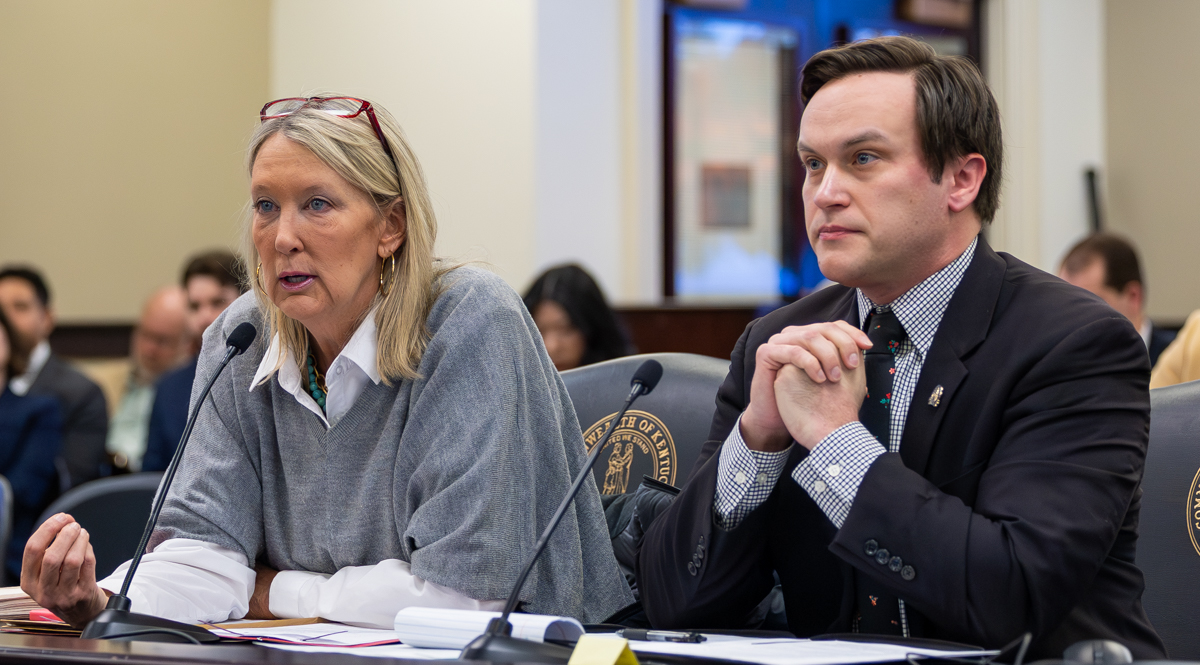
Sen. Julie Raque Adams, R-Louisville (left), speaks on Senate Bill 122 during Thursday's meeting of the Senate Judiciary Committee. Joining her is Rep. Nick Wilson, R-Williamsburg (right). A high-resolution photo can be found here.
FRANKFORT — Legislation that would require Kentucky courts to consider alternative sentences for certain nonviolent felony convictions where the defendant is a primary caretaker of a dependent child advanced in the Senate Judiciary Committee on Thursday.
Senate Bill 122, sponsored by Sen. Julie Raque Adams, R-Louisville, requires courts, upon a defendant's post-conviction motion, to consider whether the defendant is a caretaker of a dependent child before sentencing for a felony. If the court finds the defendant qualifies as a caretaker, it must then consider an alternative sentence like probation instead of imprisonment.
Rep. Nick Wilson, R-Williamsburg, testifying with Raque Adams on the bill, said that the purpose of the bill is to help offenders to, while rehabilitating, keep their families together.
"This isn't for every parent," he said. "This is for a parent who's tried, who wants to be a caretaker, who wants to raise a family."
Sen. Phillip Wheeler, R-Pikeville, raised concerns that the bill might create a two-tiered system of justice between caretaker and non-caretaker felons.
"We are, somewhat, creating a two-tiered system of justice because a caretaker felon is going to be available for a program that keeps them out of the clink while a non-caretaker felon goes to jail," he said.
Wilson, in response, said that the bill would not create a two-tiered system. Rather, it gives judges another factor to consider when making their sentencing decision.
"I simply do not agree with the argument of a two-tiered system. Judges decide on a case-by-case basis all the time. This is just another factor that they are going to take into consideration," he said.
Sen. Danny Carroll, R-Paducah, after speaking with judges and representatives from the Commonwealth Attorney's office, questioned if the bill was necessary given other steps the court takes in their usual pretrial process.
"I spoke with representatives for the Commonwealth attorneys, and their overarching view for this bill was that it simply was not necessary. It was a solution to a problem that did not exist, and all of these options are already open to the court through the pre-sentence investigation," he said.
Wilson said that while judges might not think that requiring such a consideration at trial is necessary, it was necessary for the people living with this issue.
Senate Minority Caucus Chair Reginald L. Thomas, D-Lexington, said that the bill was a good step for Kentucky children.
"All of us want the very best for our children, and we should transfer that. We want to be the best for our children. People do make mistakes. Nobody's perfect. If parents want to come back and correct their mistakes, we ought to be stewards of that," he said.
One supporter who commented during the meeting, Gavin Herrington, said that the bill is needed to help future children of parents who might be incarcerated for a felony.
"This bill helps parents get help while staying connected to their kids. I am here today because my mom eventually got the help she needed, but it came too late. Other families deserve better timing," he said.
SB 122 now heads to the full Senate.
Committee advances legislation on fluoride in tap water
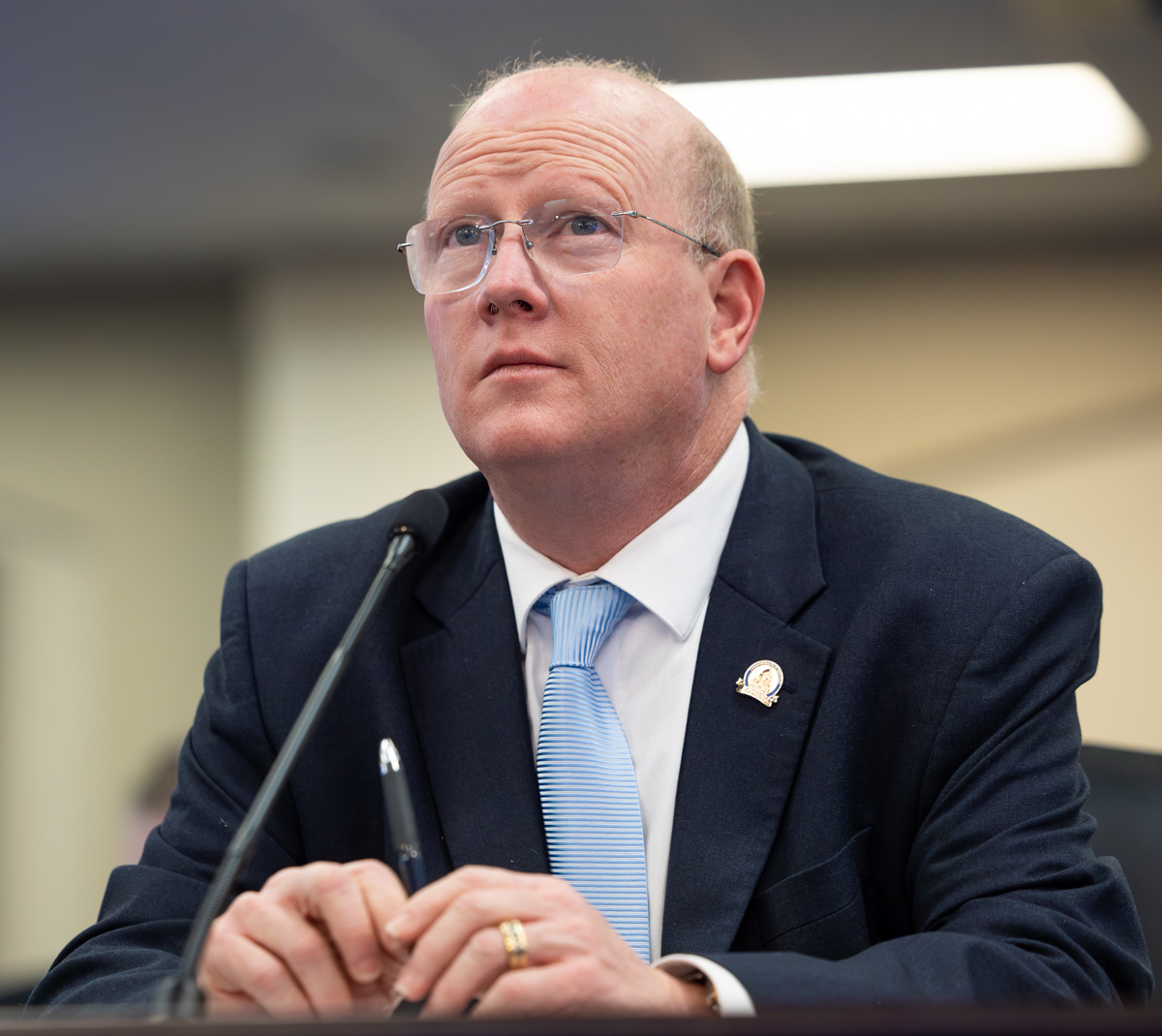
Rep. Mark Hart, R-Falmouth, speaks on House Bill 103 during Wednesday's meeting of the House of Representatives Local Government Committee. A high-resolution photo can be found here.
FRANKFORT — A bill that would shift decision-making power over fluoride in public water systems was approved by a House committee Wednesday after lengthy debate from lawmakers, dentists and public health advocates.
Rep. Mark Hart, R-Falmouth, testified that House Bill 103 would allow local water systems to decide whether to continue adding fluoride to their water supply, emphasizing the proposal does not ban fluoride.
Hart explained the bill includes an immunity clause that would protect water districts from civil lawsuits whether they choose to maintain fluoridation or discontinue it. Language was added to the bill Wednesday after discussions with legal counsel to clarify how that protection would apply, he said.
Dr. Jack Kall, a Louisville dentist and executive chair of the International Academy of Oral Medicine and Toxicology, spoke in support of the bill and cited studies on the potential negative effects of fluoride-treated water.
Kall emphasized a risk associated with fluoride consumption, saying studies "show a trend of association between lower IQ and the level of fluorides consumed by pregnant women and their infants after birth."
Rep. Sarah Stalker, D-Louisville, asked about the current standard in dentistry regarding fluoride treatment.
Kall said informed consent is central to dental care and argued that people do not have that same choice when fluoride is added to public water.
"It's a very common procedure," Kall said. "I am more cautious about it. Patients often feel that the dentist, dental hygienist or dental staff is not respectful of their personal choices. Informed consent is essential here. That's the problem we have with water fluoridation. If you don't want it, you're kind of stuck."
Rep. Rachel Roarx, D-Louisville, questioned how local boards would handle decisions traditionally guided by public health expertise and asked what medical or scientific background local water boards are required to have.
Hart said the board has requirements similar to those of a legislature.
"None of us are an expert in this field, and we are asked to make decisions without the medical knowledge," Hart said. "These executive and elected boards aren't going to have the medical knowledge either. They're going to have to seek out professionals, like I have, to help inform us."
Opponents of the bill, including some dental and public health advocates, warned that reducing fluoridation could increase tooth decay and long-term health costs.
Mary Ann Burch, a retired dental hygienist, said community water fluoridation has been proven for decades to reduce cavities and is especially important for seniors and low-income residents.
"For over 70 years, community water fluoridation has been proven safe, reliable and cost-effective," she said. "It prevents cavities by at least 25%."
She warned the consequences of reducing fluoridation would impact poorer communities, especially historically vulnerable populations in Eastern Kentucky, and drive up Medicaid costs due to increased dental.
Rep. Savannah Maddox, R-Dry Ridge asked about opponents' views on a 2024 federal court ruling in Food & Water Watch v. EPA. The court found, by a preponderance of the evidence, that recommended levels of community water fluoridation could present an unreasonable risk of injury to health, specifically citing potential IQ reduction.
Dr. Stephen Robertson, executive director of the Kentucky Dental Association, said he believes the court overreached in its decision and that the preponderance of evidence shows that fluoride has been safe.
He added that more recent research challenges claims of a link between fluoride and lower IQ and that the science has been turned into a "spin contest."
Rep. George Brown Jr., D-Lexington, voted no, saying he was not convinced fluoride poses a health risk.
"I think we're going down a slippery slope," Brown said. "It's been a standard since the 1940s, and I don't think anything has been explained here that says fluoride is a problem."
However, Rep. Ken Fleming, R-Louisville, voted in favor and explained his support for the measure.
"I'm going to trust my local water district to do the right things," Fleming said. The committee voted 13-5 to advance House Bill 103. The measure now moves to the full House for consideration
House committee approves bill to criminalize grooming of a minor
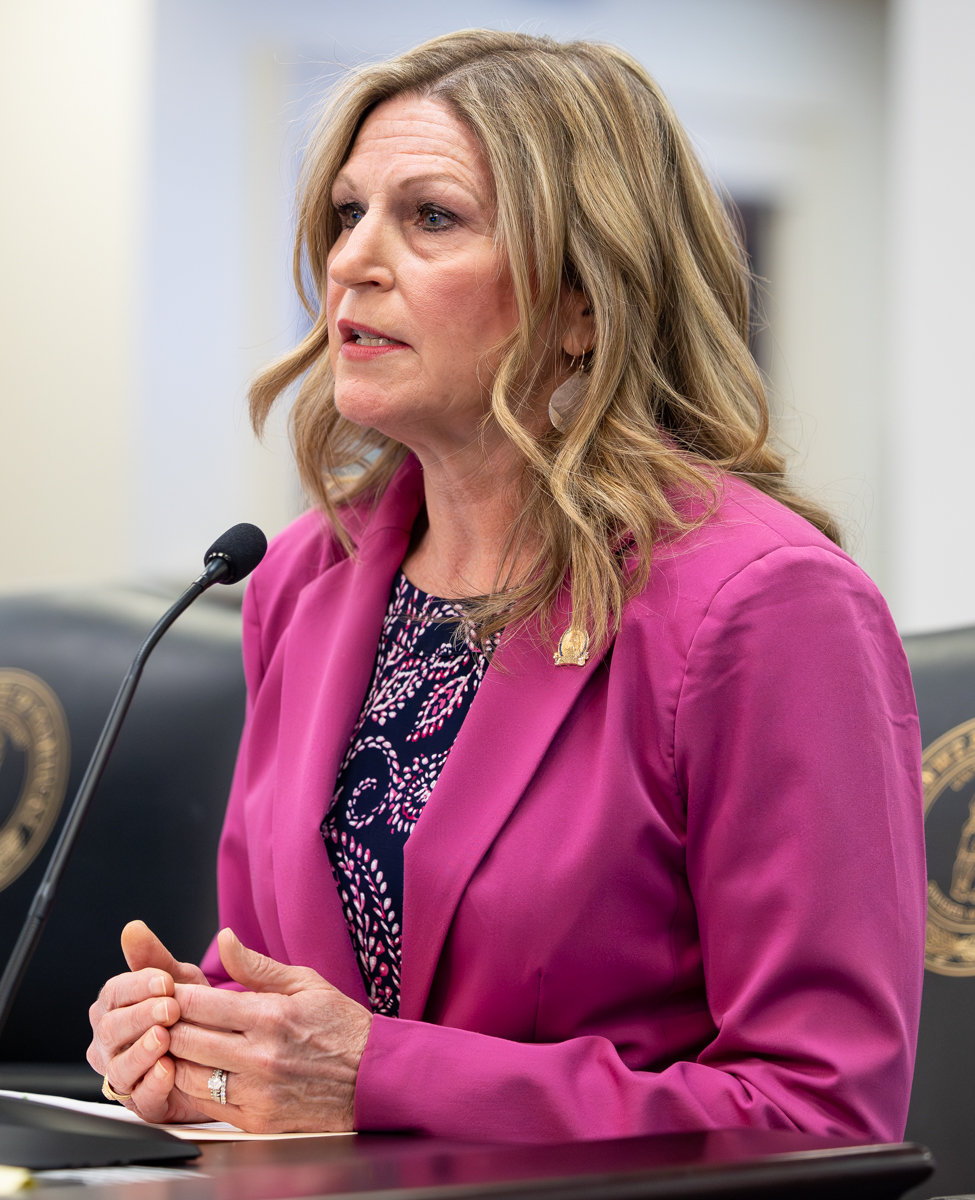
Rep. Marianne Proctor, R-Union, hopes House Bill 4 will strengthen Kentucky's sexual abuse law by criminalizing the grooming of a minor. A high-res version can be found here.
FRANKFORT — The Kentucky House of Representatives is considering a bill that would make grooming a minor a crime in Kentucky.
The House Judiciary Committee considered House Bill 4 on Wednesday. Rep. Marianne Proctor, R-Union, is the primary sponsor of the legislation. Boone and Gallatin Counties Commonwealth's Attorney Louis Kelly and Lt. Anthony Theetge with the Boone County Sheriff's Office testified alongside her.
HB 4 would criminalize grooming, which is when an adult engages in, entices, coerces, or solicits a minor to prepare them for sexual conduct, Proctor said.
The legislation defines grooming behavior as a course of conduct with a minor that is intended to establish an emotional connection with a minor through manipulation, trust-building, and influence to facilitate acts of sexual conduct or normalize or desensitize sexual acts.
Proctor said sexual abuse is on the rise, and 1 in 10 children will be the victim of sexual abuse.
"This is a gap in the law that we are hoping to close from the predatory behavior to the actual, physical sexual abuse," she said.
According to the bill, the grooming of a minor under 14 years old would be a class A misdemeanor, unless the minor is under 12 years old, then the penalty would be a class D felony.
If the adult is in a position of authority over the minor, the penalty for grooming a minor would be upgraded to a class D felony, unless the victim is under 12 years old, then the penalty would be a class C felony, the bill reads.
Rep. Nima Kulkarni, D-Louisville, said she supports the intent behind the bill, but has a few technical concerns with the language.
"Is there a carve out for communications for job-related duties for let's say a youth minister or a nonprofit that is dealing with youth and their concerns in terms of navigating sexual health and things like that?" she asked.
Kelly said the legislation includes a provision to exempt good faith, non-predatory discussions by requiring prosecutors to prove specific intent requirements.
"We think, between the statutory language and all those things, that should filter out those good faith discussions that we are not intending to include and only focus on ones that are clearly with malintent," Kelly said.
Rep. Mary Lou Marzian, D-Louisville, said she also wanted to ensure that teachers wouldn't be prosecuted for teaching sexual health curriculum.
House Majority Whip Jason Nemes, R-Middletown, read aloud the portion of the statute he believes makes it clear that teachers teaching approved sexual health curriculum would not be charged with grooming a minor.
"This statute is nowhere near that conduct," he added.
HB 4 will now go before the full House for consideration after receiving a 14-0 vote from the House Judiciary Committee. Five members chose to record a "pass" vote.
Legislature will not convene on Monday due to weather
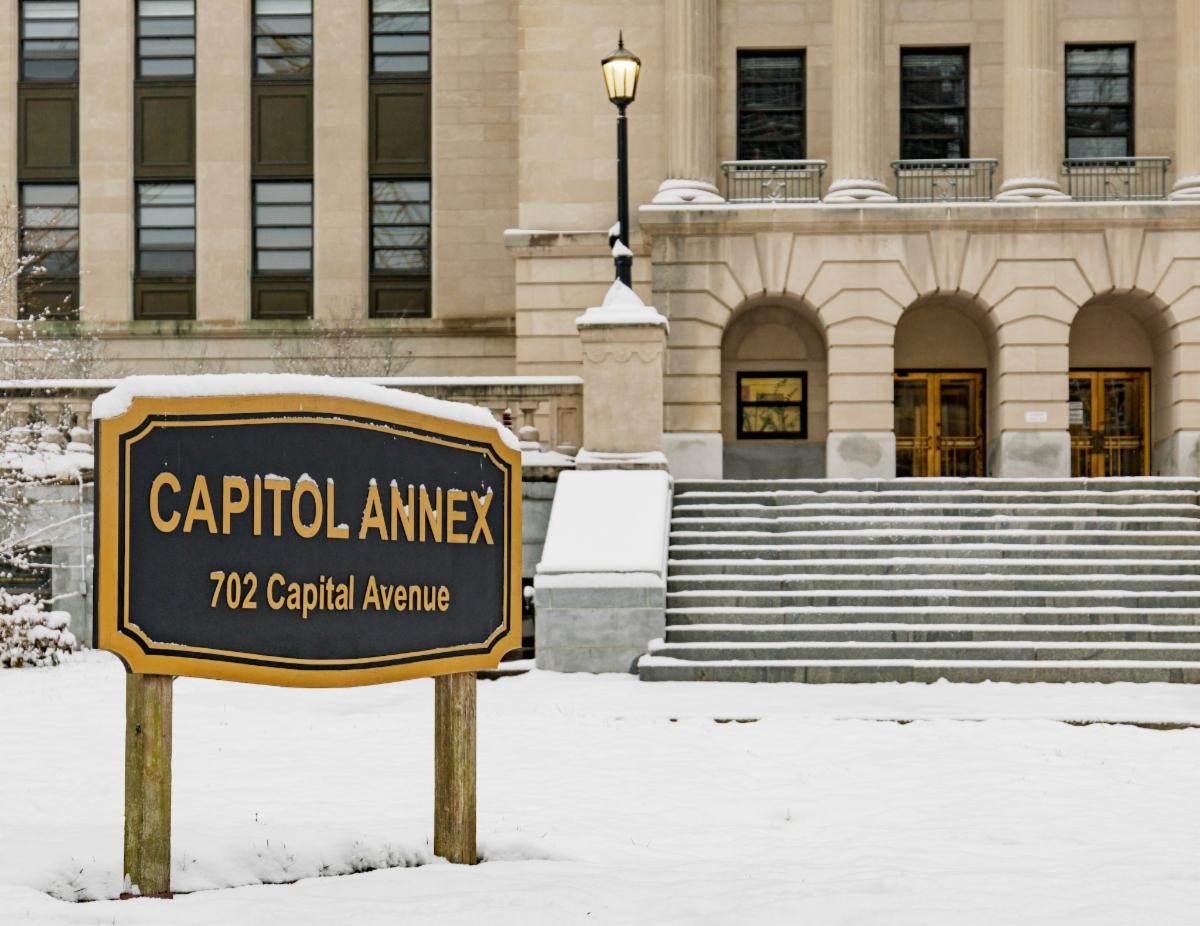
The Kentucky General Assembly will not convene on Monday, Jan. 26, due to inclement weather.
FRANKFORT — Senate President Robert Stivers and House Speaker David W. Osborne have cancelled session activities for Monday, Jan. 26, due to inclement weather.
The Kentucky General Assembly will reconvene at 4 p.m. on Tuesday, Jan. 27. It will be at the discretion of committee chairs to hold committee meetings prior to 4 p.m. that day.
Legislative activities will continue as normal through the rest of the week.
This Week at the State Capitol
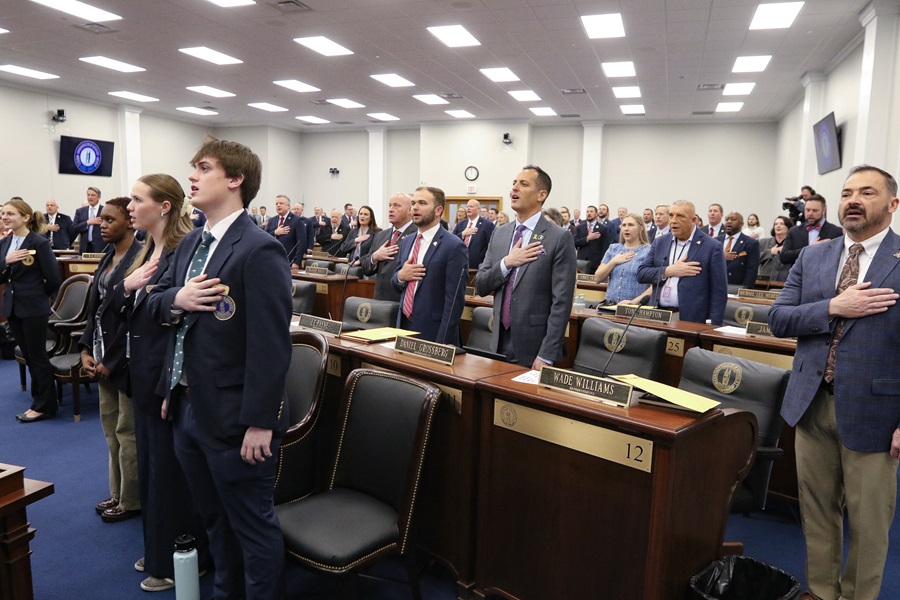
Bills on concealed carry, education, health care and human trafficking all made headway during the third week of the 2026 legislative session in Frankfort. A high-res version can be found here.
FRANKFORT — Though short, the third week of the 2026 legislative session had all the hallmarks of a general assembly in full swing – crowds in the halls, committees meeting back-to-back and bills passing in multiples off the chamber floors.
Friday marked day 13 of the 60-day session, and now that lawmakers have settled into a steady rhythm inside the new, temporary chambers of the House and Senate, all indications are pointing toward another robust year for the legislature.
More than a dozen bills moved out of committee on Wednesday – the busiest day of the session so far – and another half dozen moved on Thursday. Among them were measures on dyslexia, workplace violence, human trafficking, health care, fishing, sexual assault nurses and educational pathways for teachers.
One measure in the spotlight this week was House Bill 312 on concealed firearms. It would allow Kentuckians aged 18 to 20 years old to obtain a provisional concealed carry permit after undergoing a background check and firearms training.
The bill received approval Wednesday from the House Judiciary Committee and cleared the House floor on a 73-17 vote following nearly an hour of debate Friday.
Supporters said the measure would address inconsistencies in Kentucky gun laws for young adults who can already possess firearms but not carry them in a concealed manner. Critics argued that lowering the age limit would only increase gun violence, particularly among a vulnerable age group.
The bill now heads to the Senate.
For its part, the upper chamber acted on several bills this week related to education.
Senate Bill 181 seeks to clarify and improve an existing law adopted last year that was designed to prevent unauthorized communication between students and school personnel. The measure cleared the Senate Education Committee on Thursday.
The legislation would clarity what types of communication are considered authorized versus unauthorized and create exemptions for certain communications, such as virtual school instruction, communications that involve parent participation and phone calls from an official school telephone number, among others.
Legislators said the changes were needed to address questions that emerged in the wake of the original law, which has sought to stem inappropriate relationships between students and school employees.
Meanwhile, Senate Bill 22 is seeking to address shortages in the teaching profession by establishing educational pathways that create little to no student debt, according to supporters.
The proposal, which won support on the Senate floor Thursday afternoon, would allow school districts to establish a "grow-your-own" teacher apprenticeship program registered with the state Education and Labor Cabinet.
The Senate rounded out the week on Friday by advancing Senate Bill 76 off the chamber floor on a 28-6 vote. The measure seeks to address a recent controversy over an occupational tax increase that the Fayette County Board of Education sought to pass last year.
SB 76 would raise the population threshold required for the school board to pass such increases going forward, and during debate Friday, supporters raised concerns over public transparency and financial practices in the district.
Opponents of the bill questioned the need, arguing that the district has received clean audits and has raised graduation scores among other metrics.
Many other bills received action this week, either in committees or on the chamber floors. Here's a look at some of the measure gaining ground:
Firefighter Death Benefits – House Bill 34 would expand the list of cancers that are recognized as occupational risks for firefighters and, as a result, covered under line-of-duty death benefits. The measure cleared the House Veterans, Military Affairs and Public Protection Committee on Tuesday.
Accessibility Ramps for Veterans – House Bill 214 would create a program to help veterans with disabilities purchase accessibility ramps for their residences. The House Veterans, Military Affairs and Public Protection Committee advanced the legislation on Tuesday.
Gubernatorial Pardons – Senate Bill 10 proposes to amend the state constitution and limit the governor's ability to grant pardons and commutations for 90 days surrounding a gubernatorial election. The Senate passed the bill on Tuesday.
Distracted Driving – Senate Bill 28 seeks to curb distracted driving by limiting the use of hand-held mobile devices behind the wheel with some exceptions for navigation devices, certain types of radios and emergencies. The measure cleared the Senate on Tuesday.
Food is Medicine Initiatives – Senate Joint Resolution 23 would declare Kentucky as a "Food is Medicine" state and direct state agencies to advance Food is Medicine initiatives. The Senate Health Services Committee passed the measure Wednesday.
Dyslexia and Dysgraphia – House Bill 389 calls on the Kentucky Department of Education to annually update its guidance and evidence-based strategies for identifying and supporting students with both dyslexia and dysgraphia. The House Primary and Secondary Education Committee voted in favor of the bill on Wednesday.
Workplace Violence – House Bill 306 would strengthen laws against violence in the workplace by clarifying legal definitions and increasing penalties for repeat offenses. The House Judiciary Committee advanced the bill Wednesday.
Human Trafficking – House Bill 320 would enhance the penalty for promoting human trafficking from a class C felony to a class B felony. If the victim is a minor, the penalty would increase from class B felony to a class A felony. The legislation cleared the House Judiciary Committee on Wednesday.
Child Pornography – House Bill 366 would require someone convicted of possessing or viewing child pornography to serve 85% of their criminal sentence. The bill would also expand child pornography prohibitions to include computer-generated images of a minor. The House Judiciary Committee passed HB 366 on Wednesday.
Cremation – Senate Bill 27 would provide a cremation option for fiscal courts or local governments that are tasked with caring for the remains of indigent individuals. The Senate State and Local Government Committee advanced the bill Wednesday.
Health Insurance – House Bill 176 seeks to streamline the prior authorization process for health insurance claims by creating exceptions for certain health care providers. The bill cleared the House floor on Wednesday.
Mental Health Care – House Bill 178 aims to support the psychiatric collaborative care model, allowing primary care providers, care managers and consulting psychiatrists to work together on a patient's mental health care. The House voted in favor of the measure Wednesday.
Medicaid Delivery Model – Senate Concurrent Resolution 9 calls for a study of accountable care models used for Medicaid programs in other states. The study would also look at opportunities to implement such a model in Kentucky through a pilot program. The effort is seeking to control costs and improve health outcomes. The Senate passed the bill Wednesday.
Impaired Boating – House Bill 168 would more closely align the legal standards and penalties for boating under the influence with the standards and penalties for driving under the influence. The House Tourism and Outdoor Recreation Committee passed the legislation on Thursday.
Fishing on Private Property – Senate Bill 39 would exempt private landowners from most statewide fishing regulations while fishing on their own property, including creel and size limits. The Senate Economic Development, Tourism and Labor Committee advanced the bill Thursday.
Sexual Assault Nurse Examiners – House Bill 134 aims to expand the availability of sexual assault nurse examiners across Kentucky. It calls for a statewide coordinator to recruit nurses, facilitate training and improve collaboration between hospitals, law enforcement and rape crisis centers. The bill received approval from the House Health Services Committee on Thursday.
Homeowner Tax Exemptions – Senate Bill 51 proposes a new section of the state constitution that would exempt homeowners who are 65 and older from paying increased property taxes that result from higher assessments on their permanent residence. The bill cleared the Senate on Thursday.
The House and Senate are scheduled to reconvene on Monday. However, legislative leaders have signaled that they are monitoring a massive winter storm that will move across the state over the weekend and potentially disrupt the session calendar.
Kentuckians are urged to check the general assembly's calendar for updates. Kentuckians can track the action through the Legislative Record Webpage, which allows users to read bills and follow their progression through the chambers.
Citizens can also share their views on issues with lawmakers by calling the general assembly's toll-free message line at 1-800-372-7181.
House bill seeks to add more sexual assault nurses to hospitals
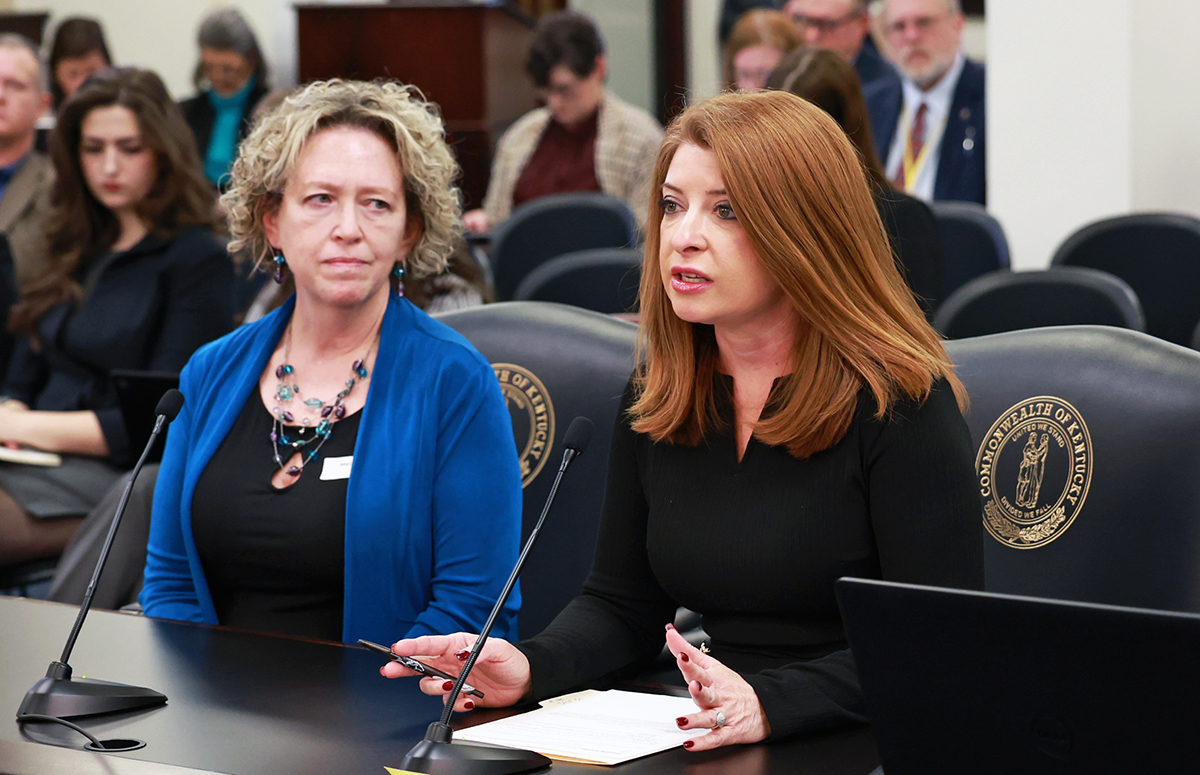
Rep. Rebecca Raymer, R-Morgantown, told the House Health Services Committee on Thursday that House Bill 134 seeks to ensure every Kentucky hospital has a sexual assault nurse examiner on staff while Kentucky nurse Melissa Gilpin looks on. A high-res version can be found here.
FRANKFORT — A Kentucky lawmaker told the House Health Services Committee on Thursday that 1 in 4 Kentucky women will be the victim of rape or an attempted rape in their lifetime.
Rep. Rebecca Raymer, R-Morgantown, hopes House Bill 134 will expand the availability of sexual assault nurse examiners (SANE) across the commonwealth, so survivors won't have to travel far from home to report their assault.
Raymer said she first learned of Kentucky's SANE access problem two years ago. When the issue was brought to her, only about 25 hospitals were accredited as SANE-ready.
"I heard accounts about a woman who had been a victim of a sexual assault," she said. The woman "came to a hospital and then was told there was not a SANE on staff. And unfortunately, that woman chose not to go to the other facility, and did not get the kit, and did not report the rape."
Last year, Raymer sponsored House Concurrent Resolution 20, which directed the Legislative Research Commission to study access to sexual assault nurse examiners and submit a report on its findings in December 2025.
Raymer said HB 134 is a result of that report. The legislation would direct the state Cabinet for Health and Family Services to employ a statewide sexual assault nurse examiner coordinator.
The coordinator would identify and recruit potential SANEs, organize and facilitate comprehensive SANE training programs, and establish and maintain relationships with key hospitals, law enforcement, rape crisis centers and more.
Additionally, HB 134 would require the cabinet to develop and maintain a state registry of SANEs by Dec. 1.
Rep. Mary Lou Marzian, D-Louisville, said she's aware many hospitals have faced issues when it comes to being SANE-ready.
"Would this ask every hospital to be SANE-ready?" she asked.
Raymer said the legislation's goal is to ensure every Kentucky hospital is SANE-ready.
According to the bill, the cabinet would be required to collaborate with the Kentucky Hospital Association, the Kentucky Board of Nursing, the Sexual Assault Response Team Advisory Committee, and others to develop a statewide strategic plan to ensure SANE coverage for all Kentucky hospitals.
The plan would be due to the Interim Joint Committee on Health Services by Dec. 1.
The House Health Services Committee unanimously approved HB 134. It now heads to the Kentucky House floor for consideration.
Senate committee green lights updates to school communications law

Sen. Lindsey Tichenor, R-Smithfield, speaks Thursday on Senate Bill 181 during a Senate Education Committee meeting. A high-res version can be found here.
FRANKFORT — The Senate Education Committee on Thursday unanimously green lighted a bill that seeks to clarify and improve an existing law designed to prevent unauthorized communication between students and those in authority at schools.
The bill's sponsor, Sen. Lindsey Tichenor, R-Smithfield, said multiple stakeholders – teachers, principals, superintendents, parents, family members and collective education groups – have offered suggestions and comments on the law that was adopted during the last legislative session.
Tichenor said the law creates a system on traceable communications within school districts to prevent those in a position of authority from having private communications with students. That puts necessary boundaries into place to close off the most easily accessible access points to children, she said.
"Although the grooming of children can happen outside of electronic communications, recent data shows that nearly 90% cases of sexual misconduct and grooming happen through this method," she said.
Tichenor said she has heard nothing but support for the intent of last year's law but has also worked with stakeholders on refining the language.
"We brought together a lot of ideas and were able to come up with some solutions that I think will meet the needs to make this bill effective, but not lose its intent," she said.
Senate Bill 181 seeks to provide clarity on what types of communication are considered authorized versus unauthorized. It creates exemptions for certain communications, such as virtual school instruction, communications that involve parent participation and phone calls from an official school telephone number, among others.
It also spells out mandatory reporting measures and updates the protocols related to parental consent.
Sen. Aaron Reed, R-Shelbyville, asked Tichenor about coaches and student-athletes' recruiting profiles.
"I'd like to hear a little bit more – like liking, sharing, commenting to reinforce what athletes have claimed. That's a big part of their recruiting ability, and I know there is a fine line to walk on that," he said.
Tichenor said public communication is permitted, and if there's ever an instance when it can't be public, the parents can give a consent form for that communication to the coach.
Senate Democratic Floor Leader Gerald A. Neal, D-Louisville, said he's grateful for stakeholder input.
"First of all, this seems to be a thoughtful revisit to this legislation. I'm glad to see that people are knowledgeable in the area have come together and did a relook and came up with some of options here. I support those options," he said.
Senate Minority Caucus Chair Reginald L. Thomas, D-Lexington, said boundaries are necessary not only in schools, but also at workplaces and elsewhere.
"In my view, this may not be a simple bill, but to me, it's a very simple concept. Because to me, this bill is all about boundaries," he said.
Committee Chair Sen. Stephen West, R-Paris, thanked Tichenor for her work and said it's important.
"This bill is a reaction to a very serious problem in the state of Kentucky. There's an epidemic of sexual misconduct in our school systems, and all you have to do is read the paper for the past two to three years to get an inkling of what's going on," he said.
SB 181 now heads to the full Senate.
Committee advances bill on dyslexia and dysgraphia
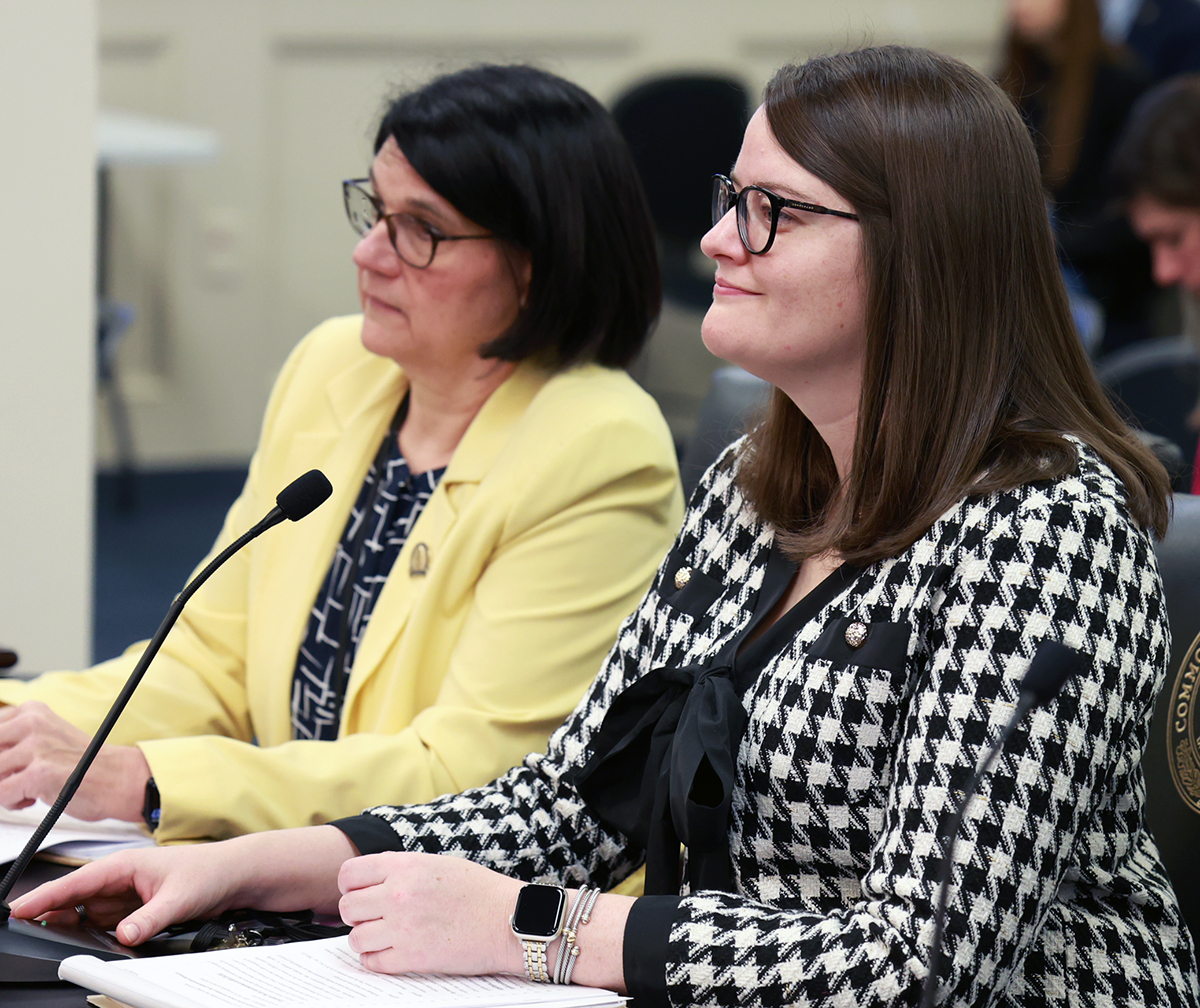
Rep. Samara Heavrin, R-Leitchfield, (right) speaks on House Bill 389 during Wednesday's meeting of the House Primary and Secondary Education Committee. Joining her is Rep. Tina Bojanowski, D-Louisville, (left), co-sponsor on the bill. A high-res version can be found here.
FRANKFORT — Legislation that would strengthen how Kentucky schools identify and support students with reading and writing difficulties was approved by the House Primary and Secondary Education Committee on Wednesday.
Rep. Samara Heavrin, R-Leitchfield, is sponsoring the bill. She said it seeks to expand literacy support in schools by formally recognizing dysgraphia in state education law and improving early screening, intervention and teacher preparation related to reading and writing disorders.
House Bill 389 would define dysgraphia in statute and require the Kentucky Department of Education (KDE) to annually update its dyslexia toolkit to include guidance and evidence-based strategies for identifying and supporting students with both dyslexia and dysgraphia.
The legislation would also require that literacy screeners and diagnostic tools used by school districts be approved by KDE and that districts report data on the implementation of evidence-based instructional practices.
"This bill was brought to me a few years ago by moms in my district," Heavrin said. "I really wanted to focus on the dyslexia and dysgraphia portion so that we could strengthen identification and support."
Heavrin emphasized the bill is not intended to mandate specific instructional approaches, but rather to provide clarity and consistency across districts while allowing KDE to guide best practices.
Committee members largely expressed support for the legislation, highlighting gaps in early intervention and the burden placed on families seeking services outside of their school district.
Rep. Tina Bojanowski, D-Louisville, said students with dyslexia and dysgraphia often fall through the cracks of the special education system. She is a co-sponsor on the bill.
"A child diagnosed with dyslexia may not be eligible for special education services," Bojanowski said. "It's important that we have mechanisms in place so that our kids with dyslexia and dysgraphia get the interventions and support that they need."
Rep. James Tipton, R-Taylorsville, questioned how many local school districts currently have policies addressing dyslexia and dysgraphia. Heavrin responded that 171 districts have implemented such policies under previous legislation.
Tipton also raised concerns about the quality of screening and diagnostic tools used for early detection. KDE representative Mickey Smith told the committee that approved tools meet national standards for validity and reliability.
"We've worked very hard to ensure that there is both validity and reliability in classification and accuracy on all of the approved tools," Smith said. "There won't be a lot of changes for school districts, but we will be providing additional supports around procedures and protocols."
Several lawmakers shared personal experiences from their time in education.
Rep. Timmy Truett, R-McKee, said students often receive accommodations through individualized education programs only after falling far behind academically.
"We're treating the symptoms, not the problem," Truett said. "Some of these kids with dyslexia and dysgraphia are the sharpest kids you've got, and right now parents are forced to go outside the school system to get help."
Rep. Scott Lewis, R-Hartford, echoed those concerns, saying access to services has long been a challenge for families, particularly in rural areas.
"This problem is bigger than we realize, and it's not fair to our kids," Lewis said. "This bill is long overdue."
HB 389 will now head to the full House of Representatives.
Committee approves concealed carry for young adults
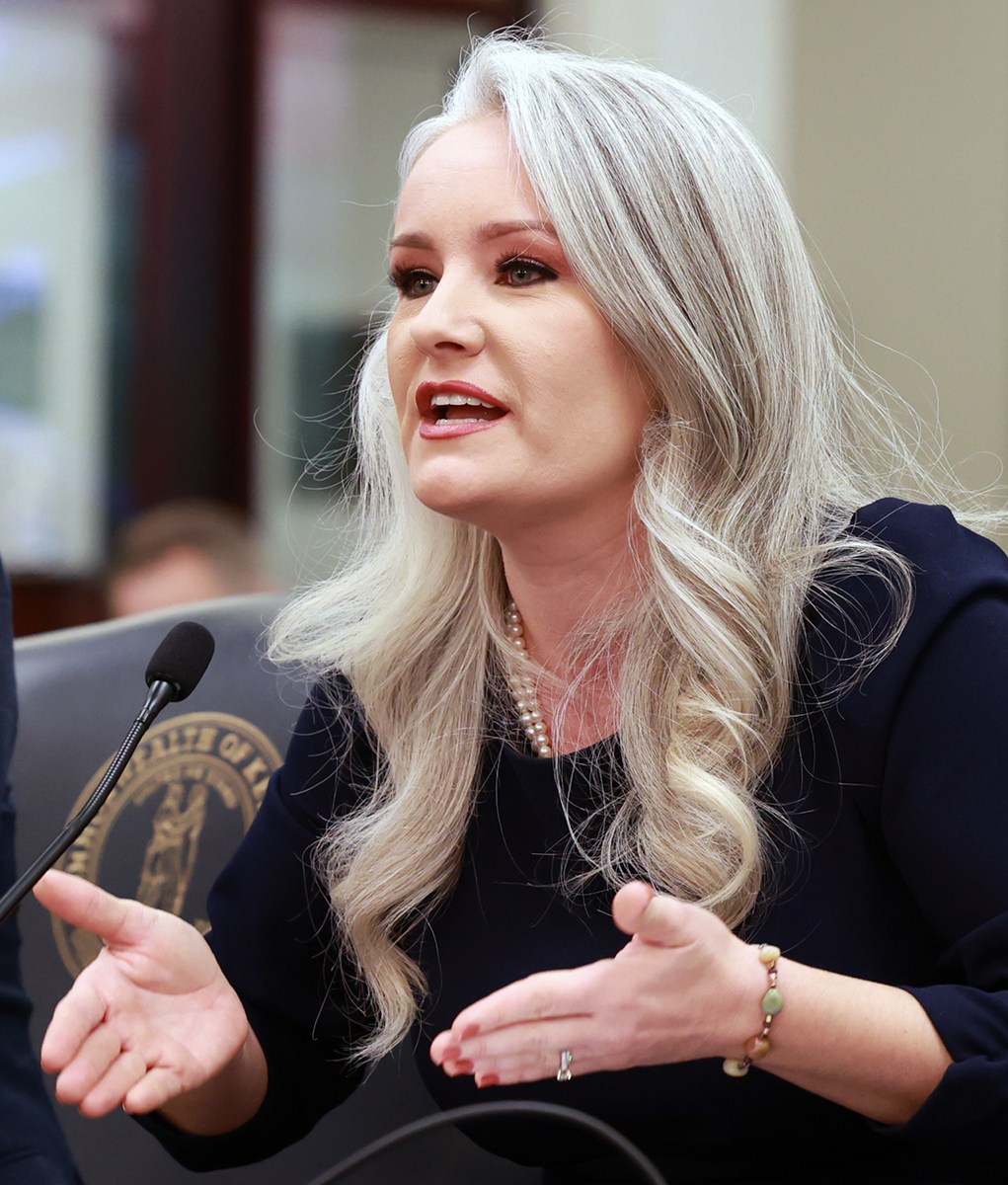
Rep. Savannah Maddox, R-Dry Ridge, advocates for House Bill 312 before the House Judiciary Committee on Wednesday. The legislation would allow 18- to 20-year-olds to obtain a provisional concealed carry license. A high-res version can be found here.
FRANKFORT — In Kentucky, 18- to 20-year-olds can possess a firearm, but cannot obtain a concealed carry license. House Bill 312 seeks to change that.
Rep. Savannah Maddox, R-Dry Ridge, is the primary sponsor of the legislation. She was joined by primary co-sponsor Rep. Josh Bray, R-Mount Vernon, to testify on the bill during Wednesday's House Judiciary Committee meeting.
"Right now, in Kentucky, citizens who are 18, 19, or 20 years old can legally vote. They can sign contracts. They can join the military, serve in combat, start a family, own a business and possess a firearm," Maddox said. "Yet, currently under the law, these same adults are prohibited from carrying that same firearm concealed for self-defense."
Under the proposed legislation, Kentucky State Police would be permitted to issue a provisional concealed carry firearm or other deadly weapons license to an 18- to 20-year-old.
Young adults would be required to undergo a background check and complete firearms training in order to qualify.
Maddox said HB 312 will "expand the ability of law-abiding citizens to exercise their constitutional rights to keep and bear arms."
If passed, Kentucky would join 25 other states that allow law-abiding citizens between the ages of 18 and 20 to conceal carry a firearm for self-defense purposes, she added.
"Our Second Amendment is clear: The right of the people to keep and bear arms shall not be infringed, and 18- to 20-year-olds are very much apart of the people," Maddox said.
Bray told the committee he agrees with Maddox's statements on the bill.
Most of the committee members shared their thoughts on the bill while explaining his or her vote.
House Minority Caucus Chair Lindsey Burke, D-Lexington, voted "no" on HB 312 due to concerns over young adults using firearms in suicide.
"I'm not even thinking about accidents or using the firearm against someone else," she said. "I think about the young people who go to college or trade school or out into the community and they kill themselves. I don't want these kids to have an easier time getting a gun."
Rep. Nima Kulkarni, D-Louisville, also expressed concerns over young adults having access to firearms.
Maddox said the bill wouldn't change access, only the ability for individuals to carry in a concealed manner.
Several other lawmakers shared they support the bill because it requires firearm safety training.
Rep. Kimberly Poore Moser, R-Taylor Mill, said she voted in favor of the legislation because she believes anytime the general assembly considers a bill on firearms, it should include provisions on safety and training.
House Majority Whip Jason Nemes, R-Middletown, said HB 312 is "a responsible approach." He believes the bill is supported by the Kentucky Constitution and that the required firearms training would protect young people instead of leading to more harm.
"I hope (the bill) makes it through to the finish line to protect our young folks and to educate them on how to use firearms," Nemes said.
HB 312 advanced from the House Judiciary Committee by a 15-3 vote. It will now go before the full House for consideration.
Senate committee advances Food is Medicine resolution
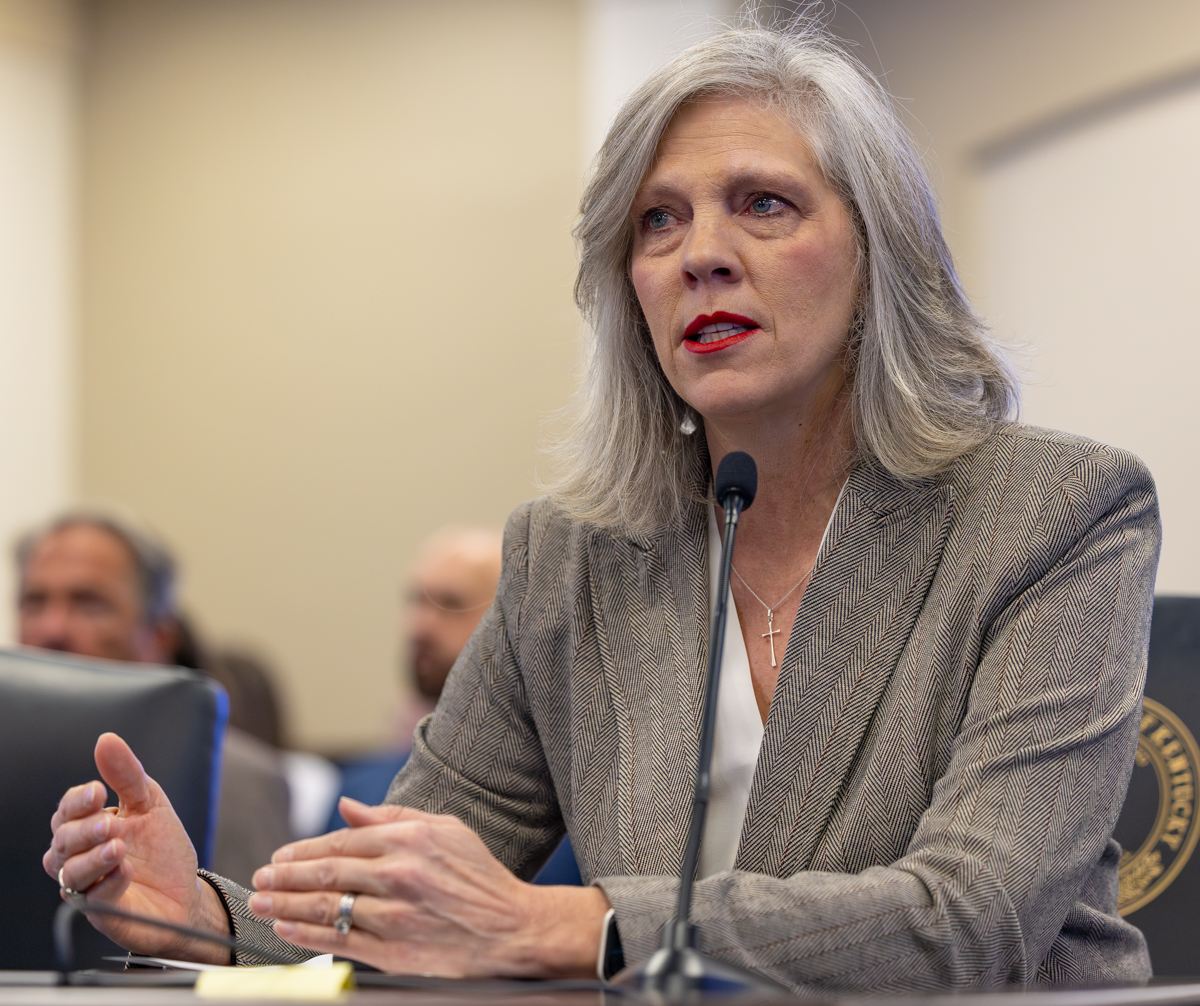
Sen. Shelley Funke Frommeyer, R-Alexandria, speaks Wednesday on Senate Joint Resolution 23 during a Senate Health Services Committee meeting. SJR 23 would declare Kentucky a Food is Medicine state and direct state agencies to advance Food is Medicine initiatives. A high-res version can be found here.
FRANKFORT — A senate joint resolution aiming to help Kentuckians prioritize nutrition advanced Wednesday during a Senate Health Services Committee meeting.
Senate Joint Resolution 23 would declare Kentucky as a "Food is Medicine" state and direct state agencies to advance Food is Medicine initiatives.
The bill's sponsor, Sen. Shelley Funke Frommeyer, R-Alexandria, said the initiatives not only bolster physical and mental well-being through food in a meaningful way, but also help farmers learn what Kentuckians are consuming while strengthening their businesses.
"This isn't just fruits and vegetables. This is protein sources. We grow some beautiful beef, pork, poultry in Kentucky as well," Funke Frommeyer said. "So, to be proudly offering that to our students would be wonderful, but of course, to our most sick Kentuckians who are in our acute care settings."
Before voting on the resolution, committee members adopted some changes to the resolution language designed to help the state receive more federal funding.
"We recognized that there are federal dollars that came from the Big Beautiful Bill that may help support our rural hospitals. So, we have a very meaningful portion of this resolution that will allow us to be more likely to pull those dollars down," Funke Frommeyer said.
Morgan Bray, who works with the Kentucky Hospital Association and the Kentucky Department of Agriculture on implementing Food is Medicine efforts, said the initiatives kicked off approximately two years ago. They have been well-received, she added.
"Today, we have 52 hospitals who have voluntarily onboarded out of the 129 that are currently in the commonwealth under the Kentucky Hospital Association," she said.
Bray said hospitals are subscribing to the initiatives on a voluntary basis, and it makes sense to put a critical lens on what patients are consuming, all while supporting local agriculture.
Dana Feldman, KDA's executive director for the Consumer and Environmental Protection Office, said the program is tailored to the needs of different organizations. Feldman and Bray have traveled throughout Kentucky to promote the initiatives.
"Everyone wants to be a part of Food is Medicine. They do see the value in it," Feldman said.
Feldman said Kentucky is a leader in the Food is Medicine efforts.
"I also want to point out that this resolution and the one that will be mirrored in the House is the first of its kind in the nation to declare a state – a Food is Medicine state – and to lay the groundwork for supporting this type of work," she said.
Funke Frommeyer said a positive aspect of Food is Medicine is helping farmers gauge demand.
Sen. Lindsey Tichenor, R-Smithfield, said she strongly supports the concept.
"Just reading through it, I think this is one of the most monumental things that we can do to get Kentucky on the right path as far as health and the impacts that this will have on health care in general," she said.
Sen. Keturah J. Herron, D-Louisville, said she's concerned about the lack of grocery stores in some neighborhoods.
"When we're talking about access, one of the biggest issues is actually brick and mortar. My district is in Louisville. I live in Old Louisville, which is a community that is a very mixed community. You have folks who are living in subsidized housing to millionaires," she said.
Herron said it's not necessarily that residents without a nearby grocery store don't want to eat healthy food; they might not have access to it. She said she's working on a bill to promote grocery store access in rural and urban areas.
Sen. Karen Berg, D-Louisville, asked the bill's supporters if they had been working with school personnel to promote healthy nutrition.
Feldman said this has been the case, and cited farm-to-school programs.
Sen. Donald Douglas, R-Nicholasville, said good nutrition needs to be taught in homes, and grocery stores will sell what people buy. He said many sources suggest that healthy food costs the same or is priced slightly lower than ultra-processed food, yet people still cling to the hope that the ultra-processed food costs less.
The resolution now heads to the full Senate for consideration.
Senate advances legislation aiming to curb distracted driving

Sen. Jimmy Higdon, R-Lebanon, speaks Tuesday on the Senate floor about a hands-free bill he is sponsoring. A high-res version can be found here.
FRANKFORT — In an effort to help keep Kentucky roads safe, the Senate passed legislation Tuesday that seeks to curb distracted driving by limiting the use of hand-held mobile devices behind the wheel.
Known as "Phone-Down Kentucky Act," Senate Bill 28 would build on Kentucky's ban on texting while driving, but includes some exceptions for navigation devices, certain types of radios and emergencies.
The bill's sponsor, Sen. Jimmy Higdon, R-Lebanon, said the legislation would modernize Kentucky law to provide clarity for drivers and law enforcement personnel.
"This bill prohibits a motor vehicle operator from holding a mobile electronic device in their hand while operating a vehicle. This includes activities such as texting, typing, scrolling or watching video content," he said.
At the same time, the bill was written with common sense and balance, Higdon said.
"It is to educate, change habits and save lives. This bill clearly allows for hand-free navigation and voice-based communication. It allows emergency calls and reporting accidents or hazards. It allows the use by first responders while performing their official duties. It allows use when a vehicle is lawfully parked or stopped," he said.
The legislation does not prohibit, for example, a motorist to have a phone in hand when located at a stop light. It also does not apply to citizen band radios, amateur radios, ham radios or commercial two-way radios.
Higdon said the bill isn't about punishing drivers; it's about preventing crashes before they happen. Law enforcement personnel must have a clear visual confirmation of unlawful use of a device before initiating a stop, he said.
"They can't seize, search, view or require forfeiture of your cell phone if you're stopped for this offense," Higdon said.
The bill also calls for the state transportation cabinet to post signage statewide so drivers will understand the law before it's enforced.
If the legislation becomes law, Kentucky will join 33 other states with similar laws. It proposes a fine of $100 for violations, but points would not be assigned to the driver's record.
Higdon said the bill isn't named after a victim of distracted driving, but he said Alyssa Burns lost her young daughter in 2022 after a serious vehicular crash and has been passionate about supporting the bill.
Sen. Brandon Smith, R-Hazard, said some of his constituents are asking if a motorist travels through an area that has surveillance, could driving while holding a cell phone be added as a secondary violation.
Higdon read from the bill, which states a motorist can't be stopped unless an officer has visually observed a violation with a clear and unobstructed view.
Smith expressed concern about what officers could potentially see through a digital format. He said there is a bit of vagueness in the legislation, but he voted for the bill.
Sen. Gex Williams, R-Verona, voted against the bill, saying collision avoidance and lane centering technology in autonomous vehicles or vehicles with driver's assistance helps motorists be safe.
Senate Majority Whip Mike Wilson, R-Bowling Green, said he voted yea because he's been a motorcyclist since he was 14 years old and he's aware of distracted driver dangers.
"Motorcycle license clubs have talked to me over and over again about the dangers of people being on their telephones, and we all see it all of the time. I've been trying to be hands-free," he said.
Wilson said he agrees with motorcycle clubs and his friends who have asked for hands-free legislation for a "long time."
"So, I'm happy to vote yea," he said.
SB 28 advanced off the Senate floor following a 31-7 vote and now heads to the House.
Firefighter death benefits bill advances
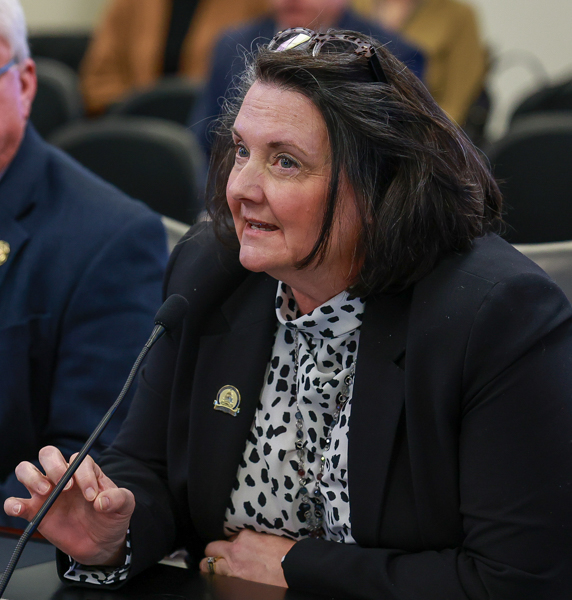
Rep. Kim Banta, R-Fort Mitchell, advocated for first responders and House Bill 34 during Tuesday's House Veterans, Military Affairs and Public Protection Committee meeting. A high-res version can be found here.
FRANKFORT — A bill to expand death benefits for Kentucky's paid and volunteer firefighters cleared its first hurdle on Tuesday.
Rep. Kim Banta, R-Fort Mitchell, is the primary sponsor of House Bill 34, which would add nine additional cancers to the list recognized as occupational cancers for firefighters.
Banta told the House Veterans, Military Affairs and Public Protection Committee it is the general assembly's responsibility to help first responders when they ask for it.
"These guys run into fires, and I think it's our responsibility to help them when something drastic happens to them because of their job," she said.
Deaths from mesothelioma, esophageal, lung, rectal, thyroid, intestinal, multiple myeloma, buccal and pharyngeal cancer would be considered line-of-duty deaths under HB 34.
Bladder, brain, colon, non-Hodgkin's lymphoma, kidney, liver, lymphatic or hematopoietic, prostate, testicular, skin, cervical and breast cancer are already covered in current statute.
Banta was joined by Jeff Taylor, the legislative and political affairs director for Kentucky Professional Fire Fighters. He told the committee cancer is the now the leading cause of line-of-duty death for firefighters.
Taylor said exposure to toxins and other carcinogens while on duty, especially during a fire, is causing the rise in cancer-related deaths for firefighters. Synthetic materials, diesel, chemicals used in turnout gear, chronic exposure to benzene, formaldehyde, heavy metals and more are to blame.
"Here in Kentucky, since 2002, we've lost more firefighters to occupational cancer than to fires, cardiac events, or other on-scene incidents combined," Taylor said.
Taylor said expanding presumptive cancer coverage is supported by modern science and medical evidence.
"(It will) provide fairness for those who risk their lives daily, reduce long term costs by enabling early detection and treatment, and ensure families receive the benefits they've earned and they deserve," he added.
Rep. DJ Johnson, R-Owensboro, said he supports the legislation.
"This question I'm going to ask is not going to impact my ‘yes' vote at all, but it's a question I think we have to ask," he said. "And that is, do you have any idea what the fiscal impact is going to be from the bill?"
Banta said the fiscal reports always come back as "indeterminable" each time she's requested one.
"Because we don't know how many are going to pass away with these cancers or these new cancers that are added," she said.
The committee unanimously voted to approve the bipartisan legislation. HB 34 is now before the full House for consideration.
This Week at the State Capitol

During the second week of this year's 60-day legislative session, lawmakers began to move bills through committee and continued to introduce new measures on the House and Senate floors. A high-res version can be found here.
FRANKFORT — The 2026 legislative session kicked into a higher gear this week as dozens of bills began moving through committee, including several measures related to driving, the state constitution and health care coverage.
Leading the pack in the Senate was Senate Bill 7, which seeks to ease the process for renewing or obtaining a duplicate driver's license, particularly for residents in rural areas.
The legislation would allow certain offices in local government – such as county clerk's and sheriff's offices – to provide renewal and duplication services for driver's licenses. Participation would be voluntary for local officials, and the bill allows those offices to collect a $25 convenience fee.
SB 7 cleared the Senate Transportation Committee on Wednesday and received a favorable vote on the floor Friday, making it the first bill to pass out of a chamber this session. It now heads to the House.
Most of the floor action in the House and Senate this week centered on continuing to introduce bills for the 60-day session, which hit day 9 on Friday.
Bills filings remained steady in both chambers, and among them were House proposals for the judicial and legislative branch budgets – both key in this year's deliberations for the next budget biennium.
The House and Senate also took time on Tuesday to memorialize the victims of United Parcel Service Fight 2976, which claimed of lives of 15 people when it crashed at the Louisville airport in November. Lawmakers stood in silence to honor the victims and commend the first responders who aided during the disaster.
In committee, the action picked up momentum on Wednesday. That's when the Senate State and Local Government Committee voted to advance two measures related to the Kentucky Constitution.
Senate Bill 10 proposes to amend the state constitution and limit the governor's ability to grant pardons and commutations for 90 days surrounding a gubernatorial election.
Senate Bill 51 proposes a new section of the state constitution that would exempt homeowners who are 65 and older from paying increased property taxes that result from higher assessments on their permanent residence.
If the bills win final passage this year, Kentucky voters would still need to ratify the amendments before they could take effect.
The House Banking and Insurance Committee also moved Wednesday to advance House Bill 176, which seeks to streamline the prior authorization process for health insurance claims by creating exceptions for certain health care providers.
Here's a look at some of the other bills that were on the move this week:
Medicaid Delivery Model – Senate Concurrent Resolution 9 calls for a study of accountable care models used for Medicaid programs in other states. The study would also look at opportunities to implement such a model in Kentucky through a pilot program. The effort is seeking to control costs and improve health outcomes. The Senate Health Services Committee advanced the legislation Wednesday.
Distracted Driving – Senate Bill 28 would expand Kentucky's ban on texting while driving to include nearly all use of hand-held mobile devices behind the wheel. The measure includes some exceptions for navigation devices, radio devices and devices used in emergencies. The Senate Transportation Committee voted in favor of SB 28 on Wednesday.
Safe Room Rebates – Senate Bill 11 would create a pilot program that helps Kentuckians build safe rooms in their homes to serve as emergency shelters during dangerous weather. The goal is to eventually provide grant-funded rebates to help cover the cost of building the rooms. The Senate Committee on Veterans, Military Affairs and Public Protection advanced the legislation on Thursday.
Dual Credit Scholarships – Senate Bill 22 would allow school districts to establish a "grow-your-own" teacher apprenticeship program as part of an effort to address shortages in the teacher profession. The Senate Education Committee advanced the measure Thursday.
Mental Health Care – House Bill 178 seeks to support the psychiatric collaborative care model, allowing primary care providers, care managers and consulting psychiatrists to work together on a patient's mental health care. The House Health Services Committee advanced the measure on Thursday.
The General Assembly will not gavel in on Monday in observance of Martin Luther King Jr. Day. But lawmakers plan to resume in the chambers on Tuesday for day 10 of the session.
Kentuckians can track the action through the Legislative Record Webpage, which allows users to read bills and follow their progression through the chambers.
Citizens can also share their views on issues with lawmakers by calling the general assembly's toll-free message line at 1-800-372-7181.
Committee advances bill on teacher apprenticeship program

Sen. Jimmy Higdon, R-Lebanon, testifies on Senate Bill 22 before the Senate Judiciary Committee on Thursday. A high-res version can be found here.
FRANKFORT — Legislation that provides Kentucky high school students a direct pathway towards teacher certification and employment within their school districts was advanced unanimously Thursday by the Senate Education Committee.
The bill, sponsored by Sen. Jimmy Higdon, R-Lebanon, gives school districts the ability to establish a "grow-your-own" teacher program, a comprehensive apprenticeship approach designed to develop new educators.
"What this program is designed to do is get those students that participate in this, when they graduate from high school, to have an associate's degree," he said. "And then go on to college in two years, they've finished their teaching certificate and hopefully return to the school that they came from to go to work."
Higdon said these apprenticeship programs would be distinct because they must be registered with the state Education and Labor Cabinet. Higdon also noted that the bill would allow for students to get their teaching certificates with little to no student debt.
"They're paid in the apprenticeship. They work, and they're paid through college. And like I said, this associate's degree is paid for through KEES scholarship money and the Work-Ready scholarship. So I think that's something that needs to be celebrated," he said.
Laura Arnold with Nelson County Schools testified with Higdon on the legislation, Senate Bill 22. She said that the bill was a positive step toward school districts finding their own way to address Kentucky's teacher shortage.
"We are grateful for you exploring this bill and are hopeful that this is the first step in incentivizing districts and communities to identify ways we can address the teacher shortage in our state," she said.
Senate Democratic Floor Leader Gerald A. Neal, D-Louisville, commented on the thoughtfulness of the legislation, and asked about the GPA requirements of the program and what would happen if a person fell behind on those requirements.
"Would it be consistent with what you're trying to do if that person took additional steps, maybe a summer school that year, and correct that?" he asked.
Higdon said he would not have a problem trying to correct that issue, but stressed that the GPA requirement was created to make sure that the students, once applying to college, would have the necessary GPA to be accepted into a postsecondary teaching program.
Senate Minority Caucus Chair Reginald L. Thomas, D-Lexington, said that he liked the program and wanted to understand the logistics of a student taking all of their apprenticeship classes and other required high school courses.
"That just seems like a lot for me for a child to take when they've got to do other courses in high school. I mean, how can they fit that all in and still take advantage of this program?" he asked.
Arnold answered that the program would be an aggressive one, and that the key would be being open and honest to parents and students that the program is accelerated, and a very rigorous path.
SB 22 now heads to the full Senate.
Prior authorization-exemption bill on the move
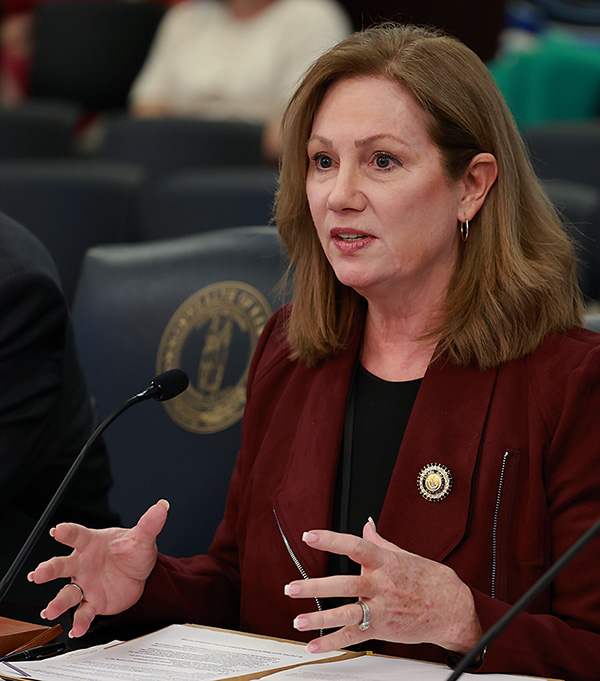
Rep. Kimberly Poore Moser, R-Taylor Mill, has spent five years working on House Bill 176, which would provide certain health care providers an exemption for the prior authorization process. A high-res version can be found here.
FRANKFORT — The House Banking and Insurance Committee advanced a bill on Wednesday that would allow certain health care providers to be exempted from the health insurance prior authorization process.
Rep. Kimberly Poore Moser, R-Taylor Mill, is the primary sponsor of House Bill 176. She told the committee the legislation would establish a framework to allow insurers to dictate the terms of prior authorization exemption for certain providers.
Moser said the current process of health care providers having to seek permission, or prior authorization, from insurers before providing care is costly and time intensive.
"It is a layer of bureaucracy that we seek to provide relief from for patients and health care providers," Moser said.
Moser said HB 176 is the result of five years of work alongside insurance companies and other stakeholders.
"We are streamlining the prior authorization process, and we're simply making it easier for Kentuckians to access the care which is prescribed for them from a health provider," she added.
Insurers would not be required to include prescriptions in the prior authorization exemption program, but could opt-in, Moser said. Behavioral health services, however, are included in the definition as a health care provider under the bill.
Moser said the bill would alleviate any dangerous or unnecessary delays in care, while still giving an insurer the ability to set the terms of the exemption program it offers within certain parameters.
Additionally, HB 176 would require the Commissioner of the Department of Insurance to produce an annual report on prior authorizations.
Rep. Chad Aull, D-Lexington, asked Moser if the legislation is like other programs in other states.
Cory Meadows, the deputy executive vice president of the Kentucky Medical Association, said HB 176 is similar to what other states are doing, and Kentucky's bill would not disrupt current existing programs.
The legislation is also Kentucky-specific, Moser added.
The committee unanimously approved HB 176. The bill will now go before the full House for consideration.
Committee green lights safe room rebate bill
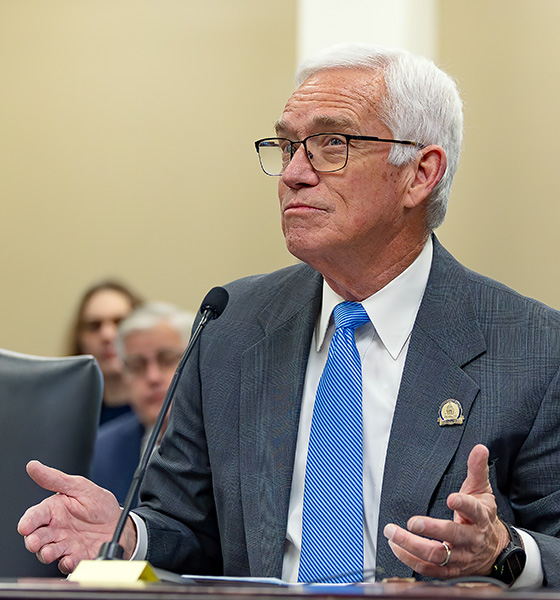
Sen. Stephen Meredith, R-Leitchfield, testifies Thursday about Senate Bill 11 during a Senate Veterans, Military Affairs and Public Protection Committee meeting. A high-res version can be found here.
FRANKFORT — In an effort to help Kentuckians build weather-safe rooms in their homes, Senate Bill 11 was given the green light Thursday by the Senate Veterans, Military Affairs and Public Protection Committee.
The bill's sponsor, Sen. Stephen Meredith, R-Leitchfield, said the proposed residential safe room rebate program would minimize deaths associated with growing tornadic activity throughout the commonwealth.
"I think that all of us have to recognize that weather patterns have changed over the last decade, and Kentucky is now part of a tornado alley, so to speak," he said. "In fact, over the last decade we would average between 21 and 28 tornadoes a year. In 2024, we had 55 tornadoes during that period."
The legislation calls for a pilot program to help Kentuckians build residential safe rooms. It would establish a safe room rebate fund to provide rebates of 50% of the costs incurred in constructing or installing a residential safe room, not to exceed $5,000.
The rooms must meet Federal Emergency Management Agency and International Code Council standards, and they must be open to communities during emergencies.
Meredith said the mayor in Morgantown, Mayor Billy Phelps, sparked his interest in the measure. The community received a large grant for a community storm shelter, but Phelps recognized that it's difficult for some residents in rural areas to travel great distances to a community shelter.
The average residential storm shelter safety room costs approximately $10,000, and homeowners would be reimbursed for the shelters after agreeing to allow others in the area to use them. Additionally, there could be standalone shelters, Meredith said.
"If you had $200,000, you could actually build 40 storm shelters. It certainly addresses the uniqueness of rural issues – of travel distance and sparsely populated areas," he said.
Meredith said staff from the Kentucky League of Cities and the Kentucky Division of Emergency Management helped create the legislation.
Sen. Gary Boswell, R-Owensboro, said the idea behind the shelters is good, but he thinks the cost to build a shelter could exceed $10,000. He asked Meredith about the total cost of the proposal.
Meredith said it's possible an appropriation would be sought after the current legislative session, but not now.
"We're trying to set the framework to build this fund so that we can accept donations, and we even think that possibly in the future that FEMA may allow us to use the funding that has been for historically the big community rooms," he said.
Sen. Gary Clemons, D-Louisville, asked who would be responsible to ensure communities have access to the shelters, and Meredith said the Kentucky Division of Emergency Management would take the lead.
Sen. Lindsey Tichenor, R-Smithfield, asked Meredith about shelter capacity.
Meredith said the capacity number varies, but he believes it's approximately 12 people to a shelter.
Sen. Brandon Smith, R-Hazard, voted for the bill and explained his vote.
"If you have ever watched Wizard of Oz, what's everybody do; they all run to the shelter together. Something so basic that we help each other – that you would probably do on your own – all these years later, we're having to codify. But I do appreciate the work," he said.
Senate Bill 11 passed out of committee on a 10-0 vote and advances to the full Senate.
Committee advances bill on driver's license renewals
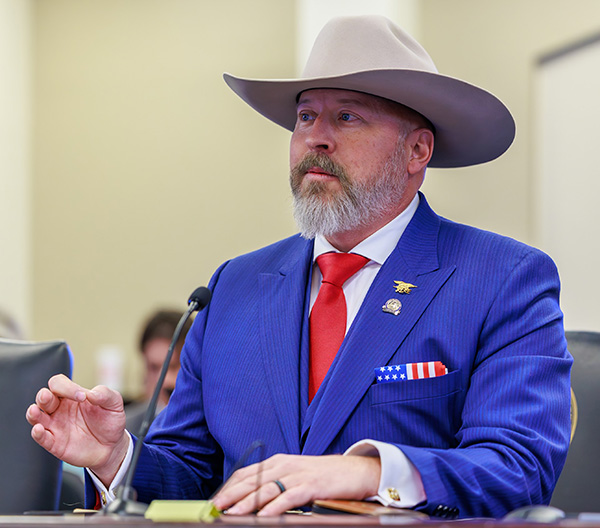
Sen. Aaron Reed, R-Shelbyville, speaks on Senate Bill 7 during Wednesday's meeting of the Senate Transportation Committee. A high-res version can be found here.
FRANKFORT — Legislation that would make it easier for some Kentuckians to renew or obtain a duplicate of their driver's licenses was unanimously advanced Wednesday by the Senate Transportation Committee.
Sen. Aaron Reed, R-Shelbyville, testified that long drives, long lines and repeated delays have caused frustration among many Kentuckians. Some residents have regional driver's licenses near their homes or workplaces, while others do not.
Under Senate Bill 7, participating county offices could only renew or duplicate a license. The bill doesn't allow first-time licensing or testing at those offices. Participation is voluntary, and no county is required to participate, Reed said.
"Unless you have a regional office in your backyard, every one of us has heard the same message from constituents that the current driver's license system is not meeting the needs of Kentucky," he said.
Reed said offering local services is a tool governments can use to better serve citizens.
"Senate Bill 7 provides a practical, conservative solution by giving counties the option to bring driver's license renewals back home. It's not a mandate. I need to stress that. It is an option," he said.
Reed said the legislation includes a $25 convenience fee that will be retained locally so counties can "break even and avoid an unfunded mandate."
Multiple constitutional offices – such as those of county clerks, circuit clerks, sheriffs, and county judge executives – would be eligible to offer the services. This would provide more possibilities for counties, and interlocal agreements would allow sharing of personnel, equipment or space.
"This bill strengthens rural access, reduces travel burdens on families, improves customer service statewide and restores accountability to local officials who already serve their communities with excellence," Reed said.
Sen. Greg Elkins, R-Winchester, thanked Reed for his work on the legislation. He asked Reed about possible fraud that could occur at the new offices.
"Do you think restoring this back to the county level will help with that fraud issue, and did you have any thoughts on that as you put this together?" he asked.
Reed said the legislation wouldn't directly affect fraud, but it could have positive outcomes because the burden would be on the locally elected officials.
Sen. Brandon Smith, R-Hazard, also commended Reed, and said Chairman Sen. Jimmy Higdon, R-Lebanon, reached out to him and most likely others to seek a solution to improve the situation.
"One thing was consistent; that people wanted something done. This has really put a lot of strain on some areas. If you have one in your area, it's not bad, but if you're in a rural area and you have any kind of health issues, whatever, it becomes a boondoggle if you will," Smith said.
Sen. Donald Douglas, R-Nicholasville, said aging Kentuckians are going to be happy to have an option when renewing or duplicating their licenses.
Sen. Gex Williams, R-Verona, described the legislation as bipartisan.
"I just want you to know you did an outstanding job getting I think 28 senators as cosponsors including the minority floor leader," he told Reed. "So, this is truly a bipartisan bill. I think maybe some others will jump on it before it's all over."
SB 7 now heads to the full Senate.
This Week at the State Capitol
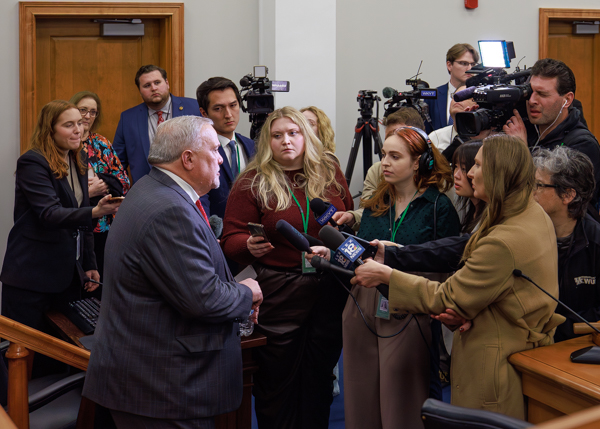
Senate President Robert Stivers, R-Manchester, answers questions from the press on the Senate floor during the first week of the 2026 legislative session. A high-res version can be found here.
FRANKFORT — From the moment lawmakers gaveled into the 2026 legislative session on Tuesday, the Kentucky General Assembly was already notching a new mark on the history of state government.
No committees have held hearings. No bills have received a vote yet. But for the first time since 1910, lawmakers are convening a regular session of the general assembly outside the hallowed chambers of the Kentucky State Capitol.
A 26,000-square foot temporary building next to the Capitol Annex will play host to the general assembly over the next few years as the state Capitol undergoes extensive restoration work to preserve the landmark for future generations.
Some may have missed the marble columns and soaring rotunda of the Capitol this week when proceedings kicked-off in the chambers. But otherwise, business was moving forward in typical fashion for a 60-day budget session.
Legislators filed more than 250 bills and more than 50 resolutions on the House and Senate floors, and the proposals seek to address a full spectrum of issues – education, taxes, health care, jobs, religion, firearms, crime and privacy, among others.
Lawmakers also updated the House and Senate rules to reflect the temporary setting and remove some of the procedures adopted during the COVID pandemic.
The Senate punctuated the week by welcoming a new member to the ranks; Sen. Gary Clemons, D-Louisville, received the oath of office on Tuesday, filling a vacancy left by former senator, David Yates, who was appointed to serve as Jefferson County Clerk in October.
In other action, Sen. Cassie Chambers Armstrong, D-Louisville, has been named as minority whip in that chamber.
In the House, Rep. Lindsey Burke, D-Lexington, was named as minority caucus chair, and Rep. Joshua Watkins, D-Louisville, was named as the new minority whip.
Other leadership positions remain unchanged from last year.
The general assembly meets in 60-day sessions during even-numbered years and in 30-day sessions during odd-numbered years.
Hundreds of bills are introduced each session, and the state's biennial budget is one of the most anticipated measures that lawmakers are tasked with adopting during a "long" 60-day session.
The next spending plan will guide state appropriations through the end of fiscal year 2028 and is expected to generate as much debate as any measure this session.
Lawmakers have been crunching numbers and hearing testimony about the state's budget needs for months, and the House Majority Caucus is expected to introduce its plan within the next several weeks.
Members of the House Minority Caucus filed legislation Friday that reflects budget proposals the governor unveiled earlier this week.
The general assembly will reconvene on Monday for day five of the session.
Legislators have until March 2 to file new bills in the Senate and until March 4 to file new bills in the House. The general assembly is set to adjourn sine die on April 15.
Kentuckians can track the action through the Legislative Record Webpage, which allows users to read bills and follow their progression through the chambers.
Citizens can also share their views on issues with lawmakers by calling the general assembly's toll-free message line at 1-800-372-7181.
Stay connected to the General Assembly during the 2026 legislative session

Lawmakers are set to convene on Jan. 6 for the first day of the 2026 Regular Session of the Kentucky General Assembly.
FRANKFORT — State lawmakers return to Frankfort on Jan. 6 for the first day of the 2026 Regular Session of the Kentucky General Assembly, and Kentuckians have many ways to follow along with the action.
Kentuckians can use online resources to:
-- See the General Assembly’s daily schedule
-- Tune in to live coverage of legislative
meetings
-- Find information on their legislators
-- Contact lawmakers and offer feedback
-- Read bills and resolutions
-- Receive a notice when a bill advances
-- See how lawmakers voted on bills and
resolutions
-- View materials on committee topics and
testimony
-- Learn about the legislative process
All that and much more is available on the General Assembly Home Page: https://legislature.ky.gov/pages/index.aspx.
Due to renovation work at the Kentucky State Capitol, the General Assembly will convene in temporary chambers next to the Capitol Annex.
The public is invited to watch the Kentucky House of Representatives and the Kentucky Senate via livestream in Annex Rooms 149, 154, 169 and 171 while the legislature is in session.
Following the General Assembly’s work often begins with a daily look at the Legislative Calendar: https://apps.legislature.ky.gov/LegislativeCalendar. The calendar shows which committees are meeting and when the Senate and House will convene.
The full 2026 session calendar and the 2026 schedules for standing committees, which are subject to change, are available on the Schedules and Calendars webpage: https://legislature.ky.gov/Schedules-Calendars/Pages/default.aspx
Livestreams of legislative action can be viewed through feeds provided by Kentucky Educational Television (KET) and the Legislative Research Commission (LRC).
KET livestreams all chamber proceedings and many committee meetings. LRC provides full coverage of all committee meetings on YouTube. For links to the livestreams, go to https://legislature.ky.gov/Public%20Services/PIO/Pages/Live-Streams.aspx.
You can find each lawmakers’ contact info, biographical info, committee assignments and sponsored legislation by clicking on the “Legislators” tab near the top of the General Assembly Home Page: https://legislature.ky.gov/Pages/index.aspx. You can also look up who represents your district.
The online Legislative Record ( https://legislature.ky.gov/Legislation/Pages/default.aspx) has information on every piece of legislation introduced in the Senate and House. You can read summaries, the full text of bills, resolutions, amendments and see exactly how far each piece of legislation has advanced in the process. Bills can be looked up according to bill number, sponsor or topic. If a bill has been voted on in a chamber, you can see how each lawmaker voted by clicking “Vote History” on a bill’s summary page.
Bill Watch, a bill tracking service provided through a partnership of Kentucky.gov and LRC, sends users email notifications each time the bills they are interested in take a step forward. To sign up for Bill Watch, go to https://kentucky.gov/services/pages/billwatch.aspx.
Information about legislative committees is available at https://legislature.ky.gov/Committees/Pages/default.aspx. To view materials such as info sheets, handouts and PowerPoint presentations that are compiled for lawmakers to review at committee meetings, click on the “Meeting Materials” tab on the left side of each committee’s page.
To share feedback on an issue with lawmakers, call the General Assembly’s Message Line at 1-800-372-7181. Kentuckians with hearing loss can use Kentucky Relay by dialing 7-1-1.
A Spanish language line for legislative information will be available throughout the General Assembly’s 2023 session by calling 1-866-840-6574.
To directly reach a lawmaker’s office, call 502-564-8100. An operator will transfer the call to the office of the lawmaker you want to reach.
If you have a question about the lawmaking process or legislative resources, the LRC Public Information can be reached by calling 502-564-8100 ext. 59105.